#its an internal promotion so at least I can get myself set up
Explore tagged Tumblr posts
Text
Thank you so much for the tags, dear friend @lurkingshan, and what a way to kick off 2025 Asian QL discourse!
@wen-kexing-apologist done dropped an outstanding response to Shan's piece here that continues the conversation about the stripping of real queer perspectives and frameworks from Asian queer media that is very much worth reading. Just to set up how I want to respond to Shan's piece, I want to emphasize the inverse relationship of the mainstreaming of queer media to both the quantity and the quality of the queerness in queer shows.
A lot of Shan's and WKA's pieces focus on Thailand, which I will as well, because QL discourse on Tumblr is dominated by what's happening in Thailand vis à vis what scholar Thomas Baudinette calls the "T-wave" of media flowing out of Thailand that includes dramas and music, frontally led by international distribution of Thai queer media. Dr. Baudinette speaks briefly about the behavior of fans in the link above, and I want to unwind on this a bit more by way of what we're talking about with the de-queering of queer media.
I've been really critical, in my Old GMMTV Challenge project on the development of the Thai QL genre, of branded pairs, and the subsequent act by fans of shipping two real-life actors into fantasies of queer relationships. Shan above links to an incredibly important piece by @bengiyo from last year where he took fans to task for conflating their fantasies about real-life actors and projecting those fantasies on their understanding of the storytelling of fictional characters. Within that, as Shan quotes above, Ben asks his audience, and I paraphrase -- can you ask yourself if you REALLY like queer people, and queerness as a whole?
I want to propose that the branded pair system, and/or the subsequent fantastical shipping of otherwise real-life people, contributes to the erasure of queerness we are currently seeing in many shows from Thailand; the high majority of them coming from GMMTV, but to the points made above, we have now seen that happen in One31's Spare Me Your Mercy, with the SMYM screenwriter going so far as to say that NC scenes -- queer sex -- would have been distracting to the telling of the show's story. That's wrenching, to say the least, because of the sheer lack of truth behind that assumption of how stories can otherwise be told with sex and romance as important context in queer stories.
How can I prove this? I'm thinking of the controversy last year between Tay Tawan and Gun Atthaphan, both members of their own TayNew and OffGun branded pairs, who were unwittingly caught sharing a brief and playful smooch while playing a game on live camera.
The "Polca" TayNew fans were subsequently up in arms online, challenging Tay Tawan to his devotion to the TayNew "ship." In other words, his fans were angry at him for popping the balloon of their shipping fantasies.
In this case, I would like to note that while we see GMMTV reducing blatant queer perspectives and frameworks from their shows, and promoting friend-ships or bro-ships, in the case of High School Frenemy and the SkyNani branded pair, we see GMMTV's (and Thai BL's) rise continue to grow in certain Asian countries (like China, Malaysia, and Indonesia, among others) that do not allow for public displays of queerness, among other restrictions. GMMTV does not hold branded pair fan meetings in these countries, and yet, these countries are some of the channel's biggest markets for its queer shows and pairs. As well, these countries (I am part-Malaysian myself) do not have public programs of sex education. Thus, if I am to assume that the majority fan bases of these shows are young folks in countries that do not offer robust sex education, then these young folks (of any gender) might not be inclined to join in and participate in conversations about queer equality.
We, thus, get the outcry that occurred after Tay and Gun smooched. God forbid fantasies were to have been destroyed because two real-life people kissed. Two men, kissing, outside of the context of their branded pairs and outside the context of a drama. Some people have never been to the club before.
It seems to me that the fantasies of the fans are worth more, as an investment by GMMTV and other studios in Thailand, than actual artistic material that focuses on queerness at this point. Capitalism and mainstreaming go very well hand-in-hand when there's money to be made, and this, to me, speaks loudly to the excellent points that Shan has made above about really great queer art being anathema to center- and conservative-mainstreams. We're getting less of really great queer art in Thailand, because the dampening of queerness in Thai shows might very well mean more bucks for the studios.
Finally, a last point about capitalism that I'd like to make. I've been seeing a rising number of posts and comments taking Tumblr bloggers to task for being critical (like, objectively critical) of bad shows. Many folks don't want to read criticism of their fave shows and stars.
I want to note that if one takes this position -- the capitalists have won again. If you're someone who's trying to prevent critical takes from being published, well, you got got by the capitalists -- the studios, the managers who want you to be so in love with your faves that you will ponder asking a writer to censor themselves from making a critical take. You might feel ownership of your blorbo, protective of your favorite star. Those critical takes may feel, to you, like a takedown of your fave.
The studios and managers of your faves also don't want these takedowns, because if a star's reputation is dampened, that'll affect their economic bottom line, and the studio's economic bottom line. Just listen to two Thai BL dudes who've been through the ringer on this very issue. This kind of capitalism and social media frenzy can have actual and harmful effects on the human actors performing these fantastical works.
The capitalists are making their play on Asian QL. It was a hell of a move for the makers of Love In The Big City to get that show out the way that it did. And I very much hope that LITBC will have a lasting impact on South Korean media -- as the earlier, and very queer, shows of the Thai QL industry once had, and might have again, if we can support really great Asian queer art with the same gusto and strength as currently popular shows enjoy.
Spare Me Your Mercy, Love in the Big City, and the Trap of Pursuing Mainstream Popularity for Queer Art

I read this excellent post by @waitmyturtles yesterday tackling the frustrating failures of Spare Me Your Mercy, a show that was one of my most anticipated of the year, but that ended up so lost in its own confusing blend of sauces that I didn't even finish it. I appreciated her clarity that despite the show receiving strong ratings and finding popularity with the mainstream domestic audience, that doesn't actually make it a success as a piece of narrative storytelling. And if anything, its popularity underlines why it was a failure as a queer narrative, in particular.

Because here's the thing about great queer art—it's almost never popular with mainstream audiences, especially in socially conservative countries. High quality, well-executed, honest and authentic queer art is more likely to be protested than celebrated in places where real queer people are not safe to live free lives. For an illustration of this, look no further than another highly anticipated queer drama of this year in Love in the Big City. Easily the queerest show to ever get made and aired on Korean television, it drew major protests before it even started, forcing the production to release it quickly in one go to ensure it would reach audiences. And why were those conservative groups so afraid of this little old drama? Because even just in its trailer and promotional materials, it was clear this was no sanitized, G-rated drama created to make gay people seem more palatable to the masses (unlike the film version with the same name, which not coincidentally has been much more warmly received by the Korean media establishment). This show was real, and raw, and QUEER in a way that terrified those bigots, because they know one of the most important ways the oppressed can advocate for themselves is by demonstrating their humanity through art.

Which brings me back to turtles’ post, and the importance of separating the concerns of art and commerce when discussing the different ways media can succeed. This is something I had some good dialogue about with @biochemjess @pharawee @clairedaring @flowerbeasblog and turtles (and even more of you in the tags) when I was still watching and posting about Spare Me Your Mercy. I originally posted to unpack why the show was flopping narratively, which turned into a discussion of the fact that it was getting good ratings from the domestic audience despite this. And while I appreciated understanding how the show is landing with its priority audience, for me, it’s very important to keep a distinction between these two different kinds of success. Especially in discussions of queer art, and especially for a show whose creators explicitly said they were intentionally downplaying the queer romance part of the queer romance ( @benkaben) to avoid “distracting” from their other messaging goals.

The important thing to keep in mind is that for queer stories, when they are popular with a mainstream audience it’s often because they are stripping any authenticity from the representation of queer people. Turtles addressed this well in her review of 2gether when she posited that part of the reason it was such a phenomenon in conservative Asian countries (aside from the timing of its release in the early days of the global pandemic), was because its presentation of queerness was mostly unrecognizable to real queer people, stripped of any true notion of queer sexuality or the realities of homophobia. Compare the reception of The Miracle of Teddy Bear—a show that absolutely refused to make its central queer character palatable for a mainstream audience, because the fact that he wasn’t palatable was the point—to that of Spare Me Your Mercy, a show whose creators chose to censor their own story. The ugly truth is that when we’re talking about queer dramas, the best and most vital shows are pretty much anathema to mainstream ratings success.

The impulse to pursue mainstream popularity and commercial success for queer art inevitably leads to watering down queer stories ( @twig-tea) to make them more light, comfortable and familiar to a majority heterosexual and socially conservative audience. And yes, of course, some degree of commercial success is necessary for queer art to get made in the first place. This is how the Thai BL market took off, by recognizing that there was an audience beyond queer people who were open to watching stories about boys falling in love, as long as it didn’t get too real. But there is a careful line to walk here, and it’s so important not to confuse popularity with artistic merit. Queer people won’t win liberation by self-censoring queer media to make it more palatable for mainstream audiences. We win when we make queer art so good and so honest that the mainstream is forced to acknowledge it. We win by challenging the mainstream perspective on queer people and how they should behave, not by catering to it. As @bengiyo said in a completely different discourse, the question is not whether the audience can love queer characters whose actual queerness is suppressed for their comfort. That kind of respectability politics is old hat and it never fucking gets us anywhere. The real question he posed is this: “Do you love us when we’re ugly, when we’re sick, when we’re old, when we’re being mean or catty?”

Which is why a show like Love in the Big City ultimately won by being so excellent, and so true, and so undeniable, that it broke through with audiences around the world and achieved some measure of recognition in spite of how very unpalatable it was to its domestic audience. Unlike Spare Me Your Mercy, this show did not get amazing domestic ratings, but its message was heard far beyond those who watched it on Korean television. And that is the point. Making authentic art that advances the struggle of queer people and making nominally queer art that can achieve mainstream popularity are completely different pursuits, and we must keep that in mind when we discuss whether and how these shows succeeded or failed. And while both must exist in a healthy media ecosystem, one will always be more vital for the survival of queer people than the other.
#thanks for the tag!#thai bl industry#bl industry#asian bl#asian ql#spare me your mercy#thai ql industry
107 notes
·
View notes
Text
Anyone else anxiety make them get to places super early just incase there's a delay commuting, traffic or you know a ridiculous obscure and impossible thing like Godzilla appearing out the river and attacking the city where I work?….no?!?….just my anxiety being fucking random then… 😅😂🙃😂😅
#my interview is at 8:30am#I've been in the office since 7:20am#its an internal promotion so at least I can get myself set up#fucking anxiety#I guess being so nervous and anxious is just a sign of how much I want it#ughhhh#personal#anxiety#mental health
8 notes
·
View notes
Text
Isn’t Everything Autobiographical?: Ethan Hawke In Nine Films And A Novel by Marya Gates
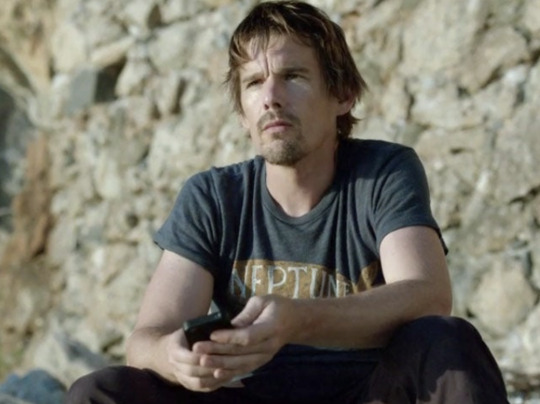
When asked during his first ever on-camera interview if he’d like to continue acting, a young Ethan Hawke replied, “I don’t know if it’s going to be there, but I’d like to do it.” He then gives a guileless shrug of relief as the interview ends, wiping imaginary sweat off his brow. The simultaneous fusion of his nervous energy and poised body language will be familiar to those who’ve seen later interviews with the actor. The practicality and wisdom he exudes at such a young age would prove to be a through-line of his nearly 40-year career. In an interview many decades later, he told Ideas Tap that many children get into acting because they’re seeking attention, but those who find their calling in the craft discover that a “desire to communicate and to share and to be a part of something bigger than yourself takes over, a certain craftsmanship—and that will bring you a lot of pleasure.”
Through Hawke’s dedication to his craft, we’ve also seen his maturation as a person unfold on screen. Though none of his roles are traditionally what we think of when we think of autobiography, many of Hawke’s roles, as well as his work as a writer, suggest a sort of fictional autobiographical lineage. While these highlights in his career are not strictly autofiction, one can trace Hawke’s Künstlerromanesque trajectory from his childhood ambitions to his life now as a man dedicated to art, not greatness.
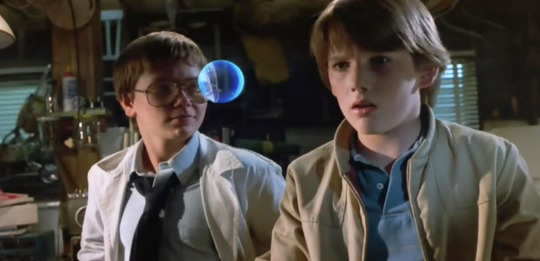
Hawke’s first two films, Joe Dante’s sci-fi fantasy Explorers with River Phoenix and Peter Weir’s Dead Poets Society with Robin Williams, set the tone for a diverse filmography filled with popcorn fare and indie cinema in equal measure, but they also served as touchstones in his development as person drawn to self-expression through art. In an interview with Rolling Stone’s David Fear, Hawke spoke about the impact of these two films on him as an actor. When River Phoenix, his friend and co-star in Explorers, had his life cut short by a drug overdose, it hit Hawke personally. He saw from the inside what Hollywood was capable of doing to young people with talent. Hawke never attempted to break out, to become a star. He did the work he loved and kept the wild Hollywood lifestyle mostly at arm’s length.
Like any good film of this genre, Dead Poets Society is not just a film about characters coming of age, but a film that guides the viewer as well, if they are open to its message. Hawke’s performance as repressed schoolboy Todd in the film is mostly internal, all reactions and penetrating glances, rather than grandiose movements or speeches. Through his nervy body language and searching gaze, you can feel both how closed off to the world Todd is, and yet how willing he is to let change in. Hawke has said working on this film taught him that art has a real power, that it can affect people deeply. This ethos permeates many of the characters Hawke has inhabited in his career.
In Dead Poets Society, Mr. Keating (Robin Williams) tells the boys that we read and write poetry because the human race is full of passion. He insists, “poetry, beauty, romance, love—these are what we stay alive for.” Hawke gave a 2020 TEDTalk entitled Give Yourself Permission To Be Creative, in which he explored what it means to be creative, pushing viewers to ask themselves if they think human creativity matters. In response to his own question, he said “Most people don’t spend a lot of time thinking about poetry, right? They have a life to live and they’re not really that concerned with Allen Ginsberg’s poems, or anybody’s poems, until their father dies, they go to a funeral, you lose a child, somebody breaks your heart, they don’t love you anymore, and all of the sudden you’re desperate for making sense out of this life and ‘has anyone ever felt this bad before? How did they come out of this cloud?’ Or the inverse, something great. You meet somebody and your heart explodes. You love them so much, you can’t even see straight, you know, you’re dizzy. ‘Did anybody feel like this before? What is happening to me?’ And that’s when art is not a luxury. It’s actually sustenance. We need it.”
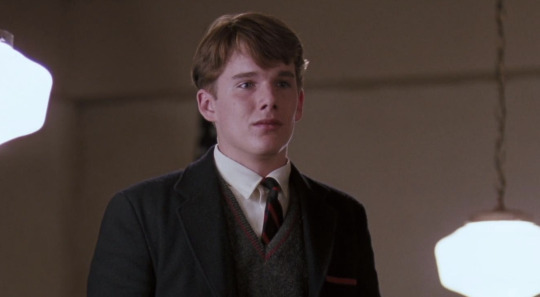
Throughout many of his roles post-Dead Poets Society, Hawke explores the nature of creativity through his embodiment of writers and musicians. Often these characters are searching for a greater purpose through art, while ultimately finding that human connection is the key. Without that human connection, their art is nothing.
We see the first germ of this attraction to portray creative people on screen with his performance as Troy Dyer in Reality Bites. As Troy Dyer, a philosophy-spouting college dropout turned grunge-band frontman in Reality Bites, Hawke was posited as a Gen-X hero. His inability to keep a job and his musician lifestyle were held in stark contrast to Ben Stiller’s yuppie TV exec Michael Grates. However in true slacker spirit, he isn’t actually committed to the art of music, often missing rehearsals, as Lelaina points out. Troy even uses his music at one point to humiliate Lelaina, dedicating a rendition of “Add It Up” by Violent Femmes to her. The lyrics add insult to injury as earlier that day he snuck out of her room after the two had sex for the first time. Troy’s lack of commitment to his music matches his inability to commit to those relationships in his life that mean the most to him.
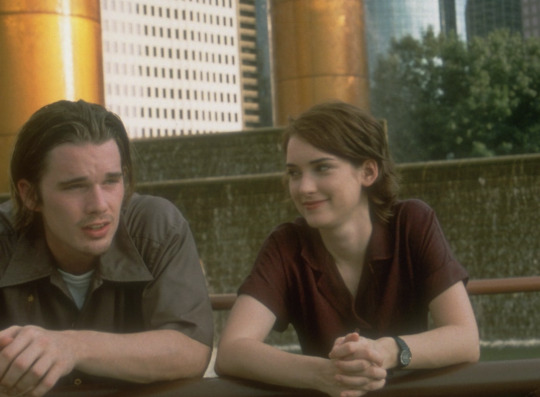
Reality Bites is also where he first positioned himself as one of the great orators of modern cinema.” Take this early monologue, in which he outlines his beliefs to Winona Ryder’s would-be documentarian Lelaina Pierce: “There’s no point to any of this. It’s all just a random lottery of meaningless tragedy and a series of near escapes. So I take pleasure in the details. You know, a quarter-pounder with cheese, those are good, the sky about ten minutes before it starts to rain, the moment where your laughter become a cackle, and I, I sit back and I smoke my Camel Straights and I ride my own melt.”
Hawke brings the same intense gaze to this performance as he did to Dead Poets Society, as if his eyes could swallow the world whole. But where Todd’s body language was walled-off, Troy’s is loud and boisterous. He’s quick to see the faults of those around him, but also the good things the world has to offer. It’s a pretty honest depiction of how self-centered your early-20s tend to be, where riding your own melt seems like the best option. As the film progresses, Troy lets others in, saying to Lelaina, “This is all we need. A couple of smokes, a cup of coffee, and a little bit of conversation. You, me and five bucks.”
Like the character, Hawke was in his early twenties and as he would continue to philosophize through other characters, they would age along with him and so would their takes on the world. If you only engage with anyone at one phase in their life, you do a disservice to the arc of human existence. We have the ability to grow and change as we learn who we are and become less self-centered. In Hawke’s career, there’s no better example of this than his multi-film turn as Jesse in the Before Trilogy. While the creation of Jesse and Celine are credited to writer-director Richard Linklater and his writing partner Kim Krizan, much of what made it to the screen even as early as the first film were filtered through the life experiences of Hawke and his co-star Julie Delpy.
In a Q&A with Jess Walter promoting his most recent novel A Bright Ray of Darkness, Hawke said that Jesse from the Before Trilogy is like an alt-universe version of himself, and through them we can see the self-awareness and curiosity present in the early ET interview grow into the the kind of man Keating from Dead Poets Society urged his students to become.
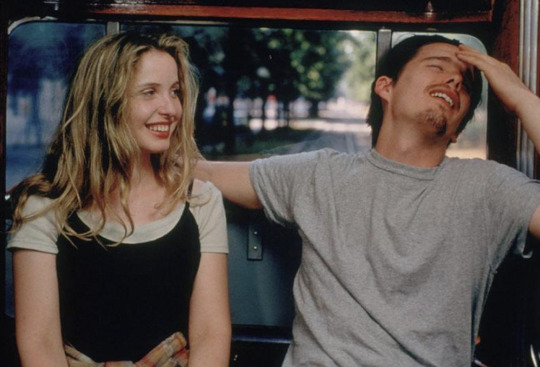
In Before Sunrise, Hawke’s Jesse is roughly the same age as Troy in Reality Bites, and as such is still in a narcissistic phase of his life. After spending several romantic hours with Celine in Vienna, the two share their thoughts about relationships. Celine says she wants to be her own person, but that she also desperately wants to love and be loved. Jesse shares this monologue, “Sometimes I dream about being a good father and a good husband. And sometimes it feels really close. But then other times it seems silly, like it would ruin my whole life. And it’s not just a fear of commitment or that I’m incapable of caring or loving because. . . I can. It’s just that, if I’m totally honest with myself, I think I’d rather die knowing that I was really good at something. That I had excelled in some way than that I’d just been in a nice, caring relationship.”
The film ends without the audience knowing if Jesse and Celine ever see each other again. That initial shock is unfortunately now not quite as impactful if you are aware of the sequels. But I think it is an astute look at two people who meet when they are still discovering who they are. Still growing. Jesse, at least, is definitely not ready for any kind of commitment. Then of course, we find out in Before Sunset that he’s fumbled his way into marriage and fatherhood, and while he’s excelling at the latter, he’s failing at the former.
As in Reality Bites, Hawke explores the dynamics of band life again in Before Sunset, when Jesse recalls to Celine how he was in a band, but they were too obsessed with getting a deal to truly enjoy the process of making music. He says to her, “You know, it's all we talked about, it was all we thought about, getting bigger shows, and everything was just...focused on the future, all the time. And now, the band doesn't even exist anymore, right? And looking back at the... at the shows we did play, even rehearsing... You know, it was just so much fun! Now I'd be able to enjoy every minute of it.”
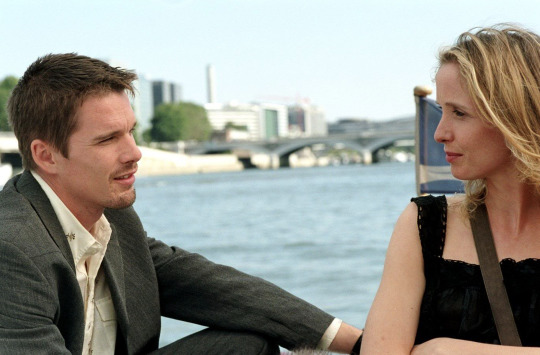
The filming of Before Sunset happened to coincide with the dissolution of Hawke’s first marriage. And while these films are not autobiographical, everyone involved have stated that they’ve added personal elements to their characters. They even poke fun at it in the opening scene when a journalist asks how autobiographical Jesse’s novel is. True to form, he responds with a monologue, “Well, I mean, isn’t everything autobiographical? I mean, we all see the world through our own tiny keyhole, right? I mean, I always think of Thomas Wolfe, you know. Have you ever seen that little one page note to reader in the front of Look Homeward, Angel, right? You know what I'm talking about? Anyway, he says that we are the sum of all the moments of our lives, and that, anybody who sits down to write is gonna use the clay of their own life, that you can’t avoid that.”
While Before Sunset was shot in 2003, released in 2004 and this monologue refers to the fictional book within the trilogy entitled This Time, Hawke would take this same approach more than a decade later with his novel A Bright Ray of Darkness.
In the novel, Hawke crafts a quasi-autobiographical story, using his experience in theater to work through the perspective he now has on his failed marriage to Uma Thurman. Much like Jesse in Before Sunset, Hawke is reluctant to call the book autobiographical, but the parallels to his own divorce are evident. And as Jesse paraphrased Wolfe, isn’t everything we do autobiographical? In the book, movie star William Harding has blown up his seemingly picture-perfect marriage with a pop star by having an affair while filming on location in South Africa. The book, structured in scenes and acts like a play, follows the aftermath as he navigates his impending divorce, his relationship with his small children, and his performance as Hotspur in a production of Henry IV on Broadway.
Throughout much of the novel, William looks back at the mistakes he made that led to the breakup of his marriage. He’s now in his 30s and has the clarity to see how selfish he was in his 20s. Hawke, however, was in his forties while writing the book. Through the layers of hindsight, you can feel how Hawke has processed not just the painful emotional growth spurt of his 20s, but also the way he can now mine the wisdom that comes from true reflection. Still, as steeped as the novel is in self-reflection, it does not claim to have all the answers. In fact, it offers William, as well as the readers, more questions to contemplate than it does answers.
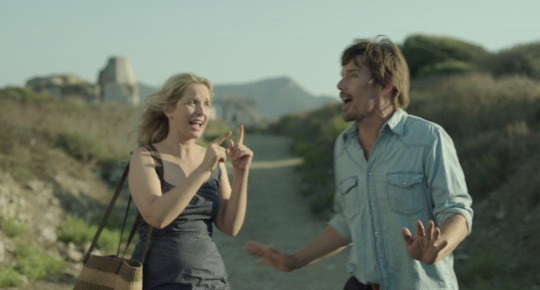
The wisdom to know that you will never quite understand everything is broached by Hawke early in the third film in the Before Trilogy, 2013’s Before Midnight. At this point in their love story, Jesse’s marriage has ended and he and Celine are parents to twin girls. Jesse has released two more books: That Time, which recounts the events of the previous film, and Temporary Cast Members of a Long-Running But Little Seen Production of a Play Called Fleeting. Before Midnight breaks the bewitching spell of the first two films by adding more cast members and showing the friction that comes with an attempt to grow old with someone. When discussing his three books, a young man says the title of his third is too long, Jesse says it wasn’t as well loved, and an older professor friend says it’s his best book because it’s more ambitious. It seems Linklater and company already knew how the departure of this third film might be regarded by fans. But it is this very departure that shows their commitment to honestly showing the passage of time and our relationship to it.
About halfway through the film Jesse and Celine depart the Greek villa where they have been spending the summer, and we finally get a one-on-one conversation like we’re used to with these films. In one exchange, I feel they summarize the point of the entire trilogy, and possibly Hawke’s entire ethos:
Jesse: Every year, I just seem to get a little bit more humbled and more overwhelmed about all the things I’m never going to know or understand.
Celine: That’s what I keep telling you. You know nothing!
Jesse: I know, I know! I'm coming around!
[Celine and Jesse laugh.]
Celine: But not knowing is not so bad. I mean, the point is to be looking, searching. To stay hungry, right?
Throughout the series, Linklater, Delpy, and Hawke explore what they call the “transient nature of everything.” Jesse says his books are less about time and more about perception. It’s the rare person who can assess themselves or the world around them acutely in the present. For most of us, it takes time and self-reflection to come to any sort of understanding about our own nature. Before Midnight asks us to look back at the first two films with honesty, to remove the romantic lens with which they first appeared to us. It asks us to reevaluate what romance even truly is.

Hawke explores this same concept again in the 2018 romantic comedy Juliet, Naked. In this adaptation of the 2009 Nick Hornby novel, Hawke plays a washed-up singer-songwriter named Tucker Crowe. He had a big hit album, Juliet, in the early ‘90s and then disappeared into obscurity. Rose Bryne plays a woman named Annie whose longtime boyfriend Duncan is obsessed with the singer and the album, stuck on the way the bummer songs about a bad breakup make him feel. As the film begins, Annie reveals that she thinks she’s wasted 15 years of her life with this schmuck. This being a rom-com, we know that Hawke and Byrne’s characters will eventually meet-cute. What’s so revelatory about the film is its raw depiction of how hard it is for many to reassess who they really are later in life.
Duncan is stuck as the self-obsessed, self-pitying person he likely was when Annie first met him, but she reveals he was so unlike anyone else in her remote town that she looked the other way for far too long. Now it’s almost too late. By chance, she connects with Crowe and finds a different kind of man.
See, when Crowe wrote Juliet, he also was a navel-gazing twentysomething whose emotional development had not yet reached the point of being able to see both sides in a romantic entanglement. He worked through his heartbreak through art, and though it spoke to other people, he didn’t think about the woman or her feelings on the subject. In a way, Crowe’s music sounds a bit like what Reality Bites’s Troy Dyer may have written, if he ever had the drive to actually work at his music. Eventually, it’s revealed that Crowe walked away from it all when Julie, the woman who broke his heart, confronted him with their child—something he was well aware of, but from which he had been running away. Faced with the harsh reality of his actions and the ramifications they had on the world beyond his own feelings, he ran even farther away from responsibility. In telling the story to Annie, he says, “I couldn’t play any of those songs anymore, you know? After that, I just... I couldn’t play these insipid, self-pitying songs about Julie breaking my heart. You know, they were a joke. And before I know it, a couple of decades have gone by and some doctor hands me... hands me Jackson. I hold him, you know, and I look at him. And I know that this boy. . . is my last chance.”
When we first meet Crowe, he’s now dedicated his life to raising his youngest son, having at this point messed up with four previous children. The many facets of parenthood is something that shows up in Hawke’s later body of work many times, in projects as wholly different as Brooklyn’s Finest, Before Midnight, Boyhood, Maggie’s Plan, First Reformed, and even his novel A Bright Ray of Darkness. In each of these projects, decisions made by Hawke’s characters have a big impact on their children’s lives. These films explore the financial pressures of parenthood, the quirks of blended families, the impact of absent fathers, and even the tragedy of a father’s wishes acquiesced without question. Hawke’s take on parenthood is that of flawed men always striving to overcome the worst of themselves for the betterment of the next generation, often with mixed results.
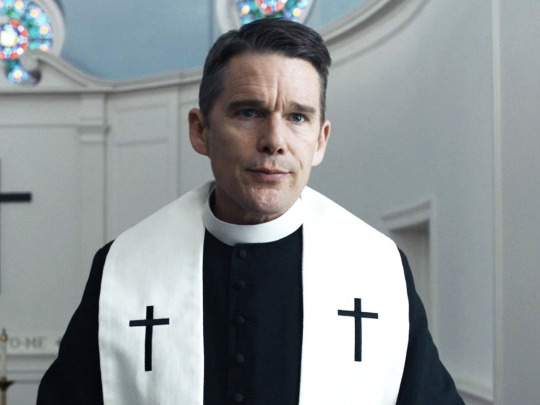
Where Juliet, Naked showed a potential arc of redemption for a father gone astray, First Reformed paints a bleaker portrait. Hawke plays Pastor Toller, a man of the cloth struggling with his own faith who attempts to counsel an environmental activist whose impending fatherhood has driven him to suicidal despair. Toller himself is struggling under the weight of fatherhood, believing he sent his own son to die a needless death in a morally bankrupt war. Sharing the story, he says “My father taught at VMI. I encouraged my son to enlist. It was the family tradition. Like his father, his grandfather. Patriotic tradition. My wife was very opposed. But he enlisted against her wishes. . . . Six months later he was killed in Iraq. There was no moral justification for this conflict. My wife could not live with me after that. Who could blame her? I left the military. Reverend Jeffers at Abundant Life Church heard about my situation. They offered me a position at First Reformed. And here I am.” How do we carry the weight of actions that affect lives that are not even our own?
If Peter Weir set the father figure template in Dead Poets Society, and Paul Schrader explored the consequences of direct parental influence on their children’s lives, director Richard Linklater subverts the idea of a mentor-guide in Boyhood, showing both parents are as lost as the kid himself. When young Mason (Ellar Coltrane) asks his dad (Hawke) what’s the point of everything, his reply is “I sure as shit don’t know. Nobody does. We’re all just winging it.” As the film ends, Mason sits atop a mountain with a new friend he’s made in the dorms discussing time. She says that everyone is always talking about seize the moment—carpe diem!—but she thinks it’s the other way around. That the moments seize us. In Reality Bites, Troy gets annoyed at Lelaina’s constant need to “memorex” everything with her camcorder, yet Boyhood is a film about capturing a life over a 12-year period. The Before Trilogy checks in on Jesse and Celine every nine years. Hawke’s entire career. in fact, has captured his growth from an awkward teen to a prolific artist and devoted father, a master of his craft and philosopher at heart.

#ethan hawke#boyhood#before trilogy#before midnight#before sunset#before sunrise#reality bites#first reformed#dead poets society#a bright ray of darkness#film writing#film essay#musings#oscilloscope laboratories
140 notes
·
View notes
Text
Propaganda in Death Note and How It Played Into Light’s God Complex
[This is based on information from the anime, as I have yet to read the manga for myself. Caps from or references to the manga may be included to emphasize points or provide visuals, but the version of the plot I'm referring to is taken from the anime.]
Light Yagami does not pick up the Death Note knowing he’s going to use it to commit mass murder and become the God of his New World.
Actually, he does the opposite. He kills someone to test it as he’s under the impression it isn’t real, convinces himself it was a freak coincidence, and decides to try it out in a way that will provide a more concrete conclusion. When it does end up working he’s stunned, to say the least.

“I killed them both...I killed two men. Those were human lives. I-It won’t be overlooked. Besides, who am I to pass judgment on others?”
Light Yagami, the perfect, straight-A, model student, has just confirmed he killed two people using some strange supernatural notebook that just happened to fall into his hands. He’s always believed strongly in his morals. He’s been on course his whole life to join the police force like his father an deliver justice, and here he is, an indirect murderer.
So what does he do about it?
...He comes up with a reason to justify himself.
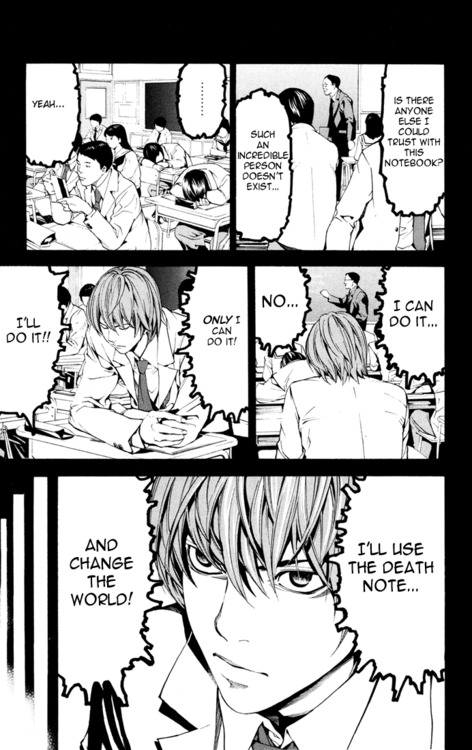
The people he killed were criminals. Mere scum who do nothing but rot and infect the world. Wouldn’t everyone be better off without them? It isn’t that he’s never considered this before, he has, albeit not to the same degree as taking their deaths into his own hands. But now that he has the power to do so, why shouldn’t he? He’s smart, he’s determined. He’s capable of it.
In fact, in his mind, he’s the only one who is.
He’s kind of right. He’s the top of his class, he comes out on top in national tests, he barely even has to try. Plus, he’s the only one that has a Death Note, and therefore the power to do this.
At this point in time, he doesn’t consider himself a god. He doesn’t want to rule the world, he just wants to change it. Something else important to note is that he doesn’t refer to himself as Kira or anything other than Light.
...That is, until...

Websites start popping up all over claiming that whoever this mass murderer is is named “Kira”, a god among men risen to punish criminals and save the world.
Two things to note here;
Apparently, “Kira” is returning, meaning there must have been some kind of previous belief in an entity that either did something similar to Light or had the same beliefs. There isn’t any other canon mention of a previous Kira, and this in and of itself is pretty vague, but given that there’s tons of religions in real life that have never had a big breakthrough, it’s reasonable to believe this could be something similar. That, or a creepypasta. Or a cult.
Light created this understanding that he had to be the one to change the world to cope with his murders. Actually - that might be the worst way to put it, since we know how strongly he feels about justice and being given an outlet to carry out this wish of world peace just enhanced this, but nonetheless... It’s impossible to assume he’s doing all of this without even a speck of guilt. Therefore, this is the first hint of appreciation or even just acknowledgement that what he’s doing is right.
Disregarding the first point (as interesting as I find it), this is really the first time Light is ever told what he’s doing is good. His own father - who he idolizes -considers Kira evil. His sister flat out says she hates him. Of course, this is all after Kira actually does become popular, but still, all he receives from that point on is disapproval from the people he cares the most about. The online love for Kira is all he has.
So, yeah, he probably internalizes it.
He thinks he’s doing the right thing. He thinks he’s giving others justice. He thinks he’s the only one who can do this. Others agreeing is only enhancing this. They’re the ones who call him God.
As the story progresses, Kira’s power and popularity grows. He gains direct news coverage, people begin sending him names of people to kill, his following grows. So much so, that when someone gets a Death Note and figures out that must be what he’s using, their immediate response is to find a way to contact him.
Cue Misa Amane and Sakura TV.
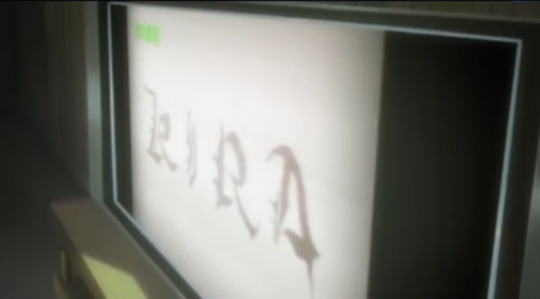
Sakura TV is a news program known for its unreliability. Demegawa, the director, even says he’s willing to make things up for publicity. And that’s when the Second Kira tapes arrive.
This, however, is only the first encounter with Sakura TV.
After this, the only direct involvement the police has with it is in the Yotsuba arc, when it’s used to lure out Higuchi. Otherwise the program promotes Kira all on its own, even going so far as to create Kira’s Kingdom - half a scam for viewers’ money, half a way to get more people to see Kira as God. And it works. He gains a following of people who believe he will create a new, better world, and will even give themselves up to help him.
An example of this following is when a mob of followers attacks the SPK under Kira’s orders. They’re so quick to join in, and are even willing to put their names and faces on TV in trust that Kira will not kill them.
All of this publicity sparks fear in the general public. People begin fearing that if they do something wrong Kira will kill them, causing crime rates to drop nearly 70% over Kira’s 6 year reign, as well as completely stopping wars.
Demegawa is eventually killed. Other news programs begin scrambling to claim the voice of Kira, topped by NHN, where we are reintroduced to Kiyomi Takada as Kira’s spokeswoman as well as one of his greatest supporters.
Light, as much as he hates Sakura TV and NHN’s depictions of Kira, uses them to his advantage as much as he can.
But really, imagine what this is all doing to him.
At the beginning, he struggled with grasping what he was doing as right. His sense of justice, righteousness, and perfectness shattered by a single notebook. But this is perfect, he figures that if he really wants to fix the world, this is one surefire way to do it. And yeah, his family hates Kira, but online he’s worshiped as God. We already know he has a pretty decent ego, and all of this is doing nothing but fueling it.
To top it all off, as he continues with his killings, his following grows. More and more people begin to support him, every single day there’s news stations upon news stations covering his story, some negative, some positive. People from all over express admiration towards him, even the President of the United States sides with him. He is literally worshiped as Kira, as God.
This all makes it sounds like his god complex starts later in the series, so to clarify; no, he does not pick up the book with plans to become God, but the second people start fueling his ego, the more twisted his ideals and motivations become. He’s the only one who can fix this rotten world. He holds the power of a god in his hands, he does what only a god can do, and everyone treats him accordingly. He is Kira, he is God.

Between websites, news programs, and his cult-like following, Light had enough attention to feed into his ego for a lifetime. He was perfect pre-Death Note. Smart, charming, set for success. There never was a time where he was particularly not narcissistic, it was just that he only felt this way inside of himself. The way he presented to others? A perfect, cool guy persona with an - in all honesty - annoying prickly jerk hiding inside. But no one ever knew this, he never let them know, and because he was always naturally successful it was more of an expectation he just met rather than surpassed, so he wasn’t consistently praised and this incredible self-esteem wasn’t propped up by anyone but himself.
To cycle back to the title of this rant-essay-analysis-whatever you’d like to call it, I want to share some examples about exactly why I even classify this news coverage and whatnot of Kira as propaganda.
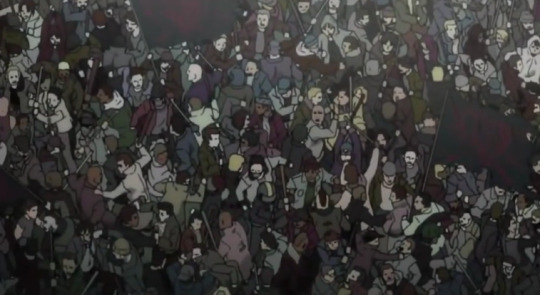
Kira’s supporters cause a riot at SPK HQ under Kira’s orders and Demegawa’s direction.
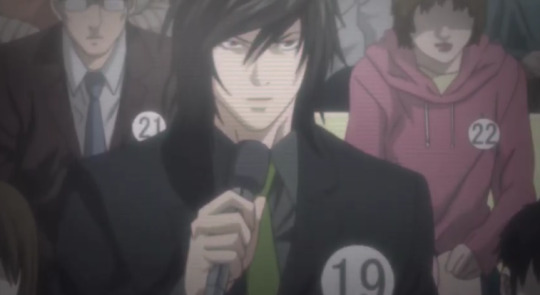
Mikami providing his insight as to why he supports Kira on television, openly promoting Kira and encouraging others to join him.
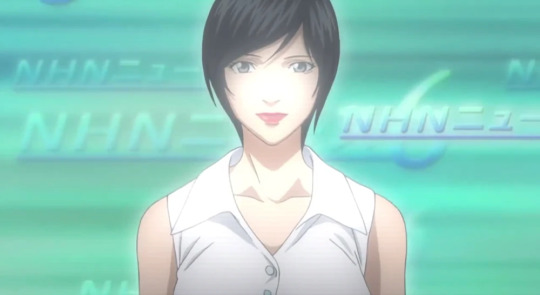
Takada announces her new role as Kira’s spokesperson on NHN.
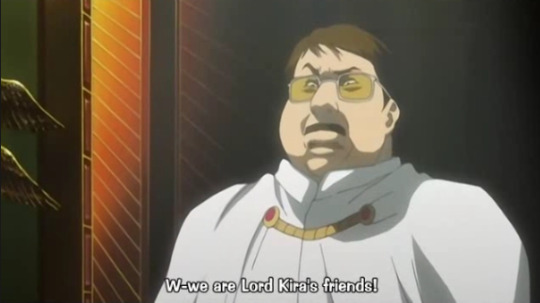
Mikami uses his power as Kira to kill members of Kira’s Kingdom, supposed followers of Kira who have been using his publicity to gain money and attention.
Most of this doesn’t exactly look like your standard propaganda posters or news story, but it does fit the overall criteria;
Information from a biased viewpoint used to promote/publicize a certain view (accepting Kira as God)
Shows exclusively positive views on Kira
Assigns Kira positive adjectives and makes him appear as good (God, savior, messenger from Hell), never considering or showing the bad
Presenting only positive statistics (Light does this in his monologue where he brings up the 70% crime rate drop, and given there’s no way he could have calculated this on his own he likely got it from one of these media sources. Not that it’s incorrect, per se, but he does fail to mention how many innocent people he’s killed in order to do this.)
Appeals to regular, everyday people by talking about how he’s doing this for the betterment of the whole world. People who are directly affected by crime are also likely positively impacted by this.
Initiates and spreads fear by explaining how Kira only attacks those who do wrong.
In the end, Light’s personal descent into his god complex, as well as his effects on the world can be attributed to many things, but it would be a crime to ignore just how big of a role news and other types of media played in this without his direct input. To think, if Light had won and overtaken the police like he was going to, he’d have absolutely no problem stepping into his shoes as God. Everyone else already set the stage, he just had to get there first.
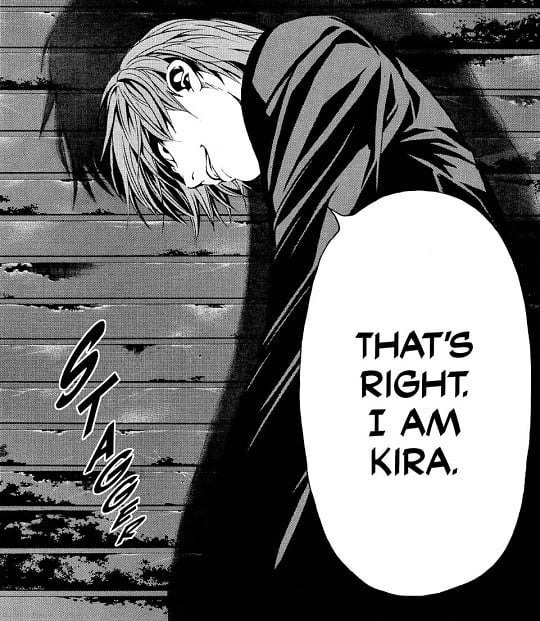
-
This is my first Death Note analysis, so please excuse any errors, I just watched the anime for the first time and am doing my best to piece together all of the plot and especially Light’s deep characterization the best I can. If I ever read the manga or find something new, chances are this will be updated. But as for now, it’s finally finished after a week or so of procrastinating. Thank you for reading if you got this far! <3
#death note#light yagami#kira#analysis#anime analysis#rant#essay#hitoshi demegawa#do people even care enough about him to have a tag#💀#death note anime#teru mikami#kiyomi takada#yagami light#mikami teru#takada kiyomi#long post#meta
111 notes
·
View notes
Note
I’d love your thoughts on BTS and their current image and music if you have them and aren’t afraid of the mindless internet hoards.
Personally, I liked a lot of their older stuff, but haven’t liked anything since I think the Fake Love promotions 3+ years ago. They’d started losing their personality and soul before that album cycle, but it feels like the sanitization of their image and artistry really kicked into hyperdrive after that. Now most of what they do seems like a sterile money grab driven by the Hybe hive mind which is a shame.
ok alrighty (cracks knuckles) let's get into it.
now that i've fully given myself a headache watching the majority of the bts videography, here are three points i'm going to cover:
performative character and the lack thereof
interesting aesthetics and the lack thereof, and
the inevitable cracking of perfection
ready, set, let's begin.
1.
idol music is very clearly definited by spectacle based aesthetics. and it's had that structure for its entire existence. so i gotta hand it to hybe for this one, because they managed to revolutionize being utterly fucking average. the triumph of bts is that they're just some guys and they look like just some guys. hybe found a niche in the system and then gamed that system to the tune of one of the largest musical acts in the world. they're not marketing bts as a romantic parasocial relationship, they're marketing them as your friends. and that is just as insidious to lonely kids as a run of the mill romantic fantasy. but that's not what i'm here to talk about today.
there's a pattern i find very interesting with bts mvs and that is that i don't remember anything about them. specifically, i don't remember the stuff that's happening IN the video; not the styling, not the setpieces, if i didn't know the members i doubt i would remember them either. what i DO remember, is how expensive the production is, and specific shots. i couldn't tell you what a single member was wearing, but i sure as hell remember that first upward angle shot of jungkook and the rusted park ride in spring day. or every single time they do that birdseye shot of jin in like every video. honestly as far as i'm aware jin has only ever worn a loose fitting beige longsleeve shirt.
it took bts a long time to establish any kind of consistent visual character. and the character they did establish.... i don't know if you can call a family-friendly-style clean aesthetic 'character'. they debuted as a hip hop group to little (comparative) success, and then made a switch to doing an early version of where they're currently at right now. if you've seen any of the mvs, you know that this is a pretty significant visual change. i don't think it is inherently a bad change, since the visual branding for hiphop based groups always tips over into iffy terrritory, but it is dramatic enough and early enough that it doesn't strike me as a natural evolution. concept switch ups are common, but they usually work because the members have established a bit of character for themselves, used their performance abilities and presence to fit into a niche in the group. the idol mould is perfect for showcasing the performers; that's its function. the groups that are the most fun to watch are the ones with stage presence, the ones who know how to perform, who can act all the parts they need to play. and bts? 4/7 actual performers on a good day. in my personal opinion it's 2/7.
i'm gonna expand on what i said about jimin here (this is technically the first part of this series), because it does apply to the rest of the group on the whole:
and i think here is where we see the main crux of the difference between taemin and jimin as performers: taemin has both an artistic and an idol persona. we know and understand him to do solo work that has a separate artistic meaning to just him being an idol. even though this performance was pre-move, i would still say this applies, because he's hot off press your number, where he's acting in a story based mv. jimin on the other hand just has his idol persona. he's not known for creating the same kind of storytelling that taemin is.
bts has been very insistent on the image of the group as a single unit. despite having the size of fanbase and the revenue that would make any official solo debut a massive success, none of them have done any substantial solo work. this isn't artistically a problem, and i think it's very admirable of them to be so dedicated to the image and the legacy of the group, when that can be an uncommon trait in the industry. i do however, think it starts to become an issue when we want to discuss what the artistic visions and images of groups are. shinee taemin and solo taemin have two distinct artistic representations, and taemin himself will attest to that. it's the same with all the shinee members that have solo careers, and the same with other groups. jackson, bambam, yugyeom, and jaebeom's solo work is all very different from got7. yixing's solo work is very different from exo's. even the subunits within exo all have their own character (cbx and sc). kpop groups all ostensibly are trained under the same system, so why the disparity with bts? mostly, it's their brand of "authenticity." it's impossible to perform authentically, by the nature of performance as a medium it is unnatural, and tragically, not everyone is naturally interesting, or suited to performing: that's why the performing arts even exist in the first place. it required painstaking training to be good at performing; it is a complex set of skills and those skills are not learnt by "being authentic." being an idol is not just the singing, dancing, rapping; that's only half the work. you need to be able to act to be a compelling performer. pulling your true self and emotions out on stage every night is a fast track to burnout and psychological issues, there's plenty of evidence. the only member of bts of whom i can say for some certainty has a persona and a stage presence is jhope/hoseok, a) because he's kept up a very specific brand in the solo work that he has done, and b) he has actual dance training, not just kpop dance training. the rest of them may have the kpop dance and the kpop vocal training, but what they do not have is the ability to market themselves as compelling performers on stage. taehyung is the only other member i would hesitantly give a semblance of persona and ability to, but i think he stumbled onto that mostly by accident. and if all the pieces don't each have a distinctive colour, how can the whole machine be visually interesting?
2.
bts may never have been able to establish an aesthetic brand, but what they did establish is an intellectual one. if you talk to a fan, the schtick they give is that "it's about the lyrics." as noble as having an intellectual or cerebral message is, what does that look like? how do you portray intellectual on stage, on film? what about intellectual is interesting to watch? cerebral, by it's literal nature as a descriptor, is very difficult to communicate in visual language because it is internal. to successfully communicate cerebrality and intellect in a short form medium like music videos requires a deft hand with metaphor that can elude even an experienced designer. and honestly? i don't know whether to applaud hybe's visual team for being the most successful subtle contemporary designers i've every seen, or to decry them as worst kpop designers i've ever seen. maybe both. regardless, i don't think they're able to cross the gap.
there are exactly four mvs where i actually remember the content of the mv and not the frame it sits in, and those are dna, idol, the singularity comeback trailer with taehyung, and war of hormone. and of an eight year career......that's not very many. these four mvs have at least an inkling of interesting spectacle and character, but even then, it's still a stretch. there is absolutely nothing to write home about in the styling for dna, other than it's well colour matched. I don't even know if I should include singularity because it involves none of the other members. idol is probably their most interesting mv because it actually has alternative styling and varies (at least a little bit) from the standard hybe boom crane shot-that-shows-off-how-we-can-afford-big-studio-spaces-and-locations. the company and the group would be loathe to admit it, but war of hormone is a well designed and interesting mv for the time it was made, with a well crafted gimmick and some actual showing of character from the members. it was the start of a potential that they squashed quite quickly because it wasn't picking up in the hiphop-group-saturated market of 2014. but the rest of their mvs? remarkably uninspired styling. like it's truly impressive how boring the styling is. and like i've said, that is the triumph in their aesthetics: they all look like normal dudes (if you had professional skin + makeup techs looking after them for the last 8 years).
all of this is a carefully crafted image that's tailored to hooking an audience, especially an international one. the mvs are boring in the relative scale of kpop, but they're just different enough from a western pop mv to catch attention. and once you do sink a hook, there's a direct clickfunnel of content that bills itself on these men being "authentic" and "self-producing," which is a huge draw to international fans, because people are racist and believe that the kpop industry is a factory that produces idols like clones, where none of them know how to do anything other than sing and dance and all the music is just handed to them by companies. and they have SO much content that there's no way a new fan can get to it all in a timely manner, so they'll never have to engage with any other kpop artists' work if they don't actively seek it out. but that's another essay for another time.
3.
that brings us to current day, in which at least the last five bts releases have been in the same aesthetic vein of positive, sanitized, and pristine. i said it in one of my txt responses and i will say it again here: money scrubs the humanity from the aesthetic of living. minimalism is for rich white people. hybe and bts may have pivoted their style and brand directly into the lane of mass appeal, but when you pair that with the amount of money funding them, there's a cognitive dissonance between the message and the aesthetics in which it's portrayed. some people do like the clean cut looks, and i won't say that they don't work, but as you've likely gleaned from this response, it isn't my style and if you've been around and reading my writing for longer you'll know that my tastes runs much closer to the messy and the weird, so very little about any of bts' visuals have appeal to me. i do find the contradiction of applying the appeal of radical relatability with the aesthetics of expansive (and expensive) minimalism interesting; it's an extremely fine line that hybe is walking and eventually they are going to tip over, the porcelain mask will not hold forever. maintaining the all ages aesthetic is going to be difficult now that all of them are grown ass men. with other groups of this member age and generation there's very obviously been a shift to a more adult tone, and not necessarily explicitly. got7, mx, nu'est, btob, shinee, 2pm, and groups that have older members like a.c.e and sf9 have all made slow shifts in tone that are undeniably aimed at a maturing audience: they know their core fanbases are aging with them and they (the fans) are not as interested in the 'boy' in boy group. and most of them have telltale visual styles, enough so that i can distinguish a specific group's mv. the last year and change of mx mvs have a very distinctive character; got7 too, since easily as far back as if you do. i can always tell an a.c.e mv by its impeccable fashion and formic styling, and although shinee has always had a more experimental aesthetic edge, their sound and voices are unmistakable.
honestly, i can't predict what bts is going to do in the future, but i personally don't believe they can keep up their clean aesthetic indefinitely without some fallout. part of the fun of following bands is watching them grow musically, and the last couple of years of bts haven't felt like growth. there are fans that have already started realizing it, and there's likely to be more soon.
---
the third part is here, which is a short followup about some of bts' industry influence.
#this is long one dear readers#a very long one#strap in#i've sat on this for probably a week now in the hopes my brain can make some interesting connections but honestly?#not a lot about bts is interesting in comparision to the rest of the kpop industry#personally i am of the opinion that lyrics do not matter in idol music and i am not interested in them in the slightest#and bts videos ARE extremely bland visually#unless you like looking at expensive production. whatever floats your boat i guess#they make a lot of sense as an entry kpop group but once you get actually into the industry there is SO much happening#which i talk about in the third part a little bit#this is way too long i am so sorry anon and everyone else who has been asking about this topic#im not entirely sure it's coherent at this point but whatever. its out there now#i wanted this to be under 1k and that emphatically did not happen#it is double that. why am i like this#875#kpop questions#kpop analysis#group analysis#text#answers
42 notes
·
View notes
Text
🌅 Thurs 22 Oct ‘20 🍋
Oh to be looking at the sunset in a lighthouse on the Amalfi coast! Well, if I can’t be there in person, I can at least make myself some golden themed postcards! How, you ask? Well, youraresogolden.com (because youresogolden.com was taken) allows you to make your own postcards with the Amalfi coast in the background. I told my friends that they were “golden”, “lemon over ice”, and “perfect now” (that last one isn’t H I know, I know it’s fiiinnneeee). The postcards have two different backgrounds, one of a cliff overlooking the sea, and one of the road that Harry was seen running on during the filming of the video. Do you think...maybe he’s running to the cliff? And then he’ll jump off? Oh, wait, wrong video, sorry! Anyways, this buildup tells us that Harry’s team is as ready as we are for this video to be available, if the eroda accounts are anything to go by. They posted the same sunny emoji that we did the other day (that’s cheating, guys!) and continue to edit the Eroda website by adding the word “golden” to some of the descriptions of the tourist attractions.
But not everything can be golden, can it? I guess its time to talk about the pigs in the pub: following Celebtm’s rather scathing article, Briana and Nick disabled their accounts, Brett went private, Tammi limited her comments, and deleted every single picture with Nick, including the engagement picture! I say that Briana and Nick have disabled their instagrams rather than deleting because you have the option to temporarily disable your account and reactivate it if you so choose to by logging back in at a later date. I know this because, um, I tried it, and fully locked myself out of my own instagram, just to see what would happen. A few stressful hours, that’s what happened! However, you can easily recover your account after a few hours, and Briana will likely be back. She’s spent too much time and money buying all those followers to throw it all away now, so I would be very surprised if she doesn’t come back when she thinks this has all blown over. It might be a little while longer before this HAS blown over, though, as TMZ picked up yesterday’s article and put it on their platform. We shall see where this goes from there, but goodness knows that TMZ looms large in fandom lore for actively taking on and ridiculing theories around Freddie’s parentage and pushing the narrative of Louis as the happy father back in the day, so for them to post an article actively raising questions concerning Louis’ involvement with Briana and Freddie is pretty exceptional!
Micheal Straus, the man who claims to be the owner of the boobs that reside in Briana’s chest, came BACK today, in true twitter fashion, with RECEIPTS! Literal ones, as in it also shows his Whole Foods and Walgreens purchases, can you BELIEVE? He can prove that he paid $1500 to a doctor in Beverly Hills, though the reason is not given on the credit card bill he gave to Celebtm. He also told Celebtm to “show her fiance [the receipt]” if he “calls [them] again to say I’m lying”. Did Nick...call Celebtm? Are they going to publish that call too? This is, ACTUALLY, Brand New Information, if you’ll pardon the Friends pun. Michael went on to make some other rather rude comments about Briana, but also refer to himself as the love of her life. Is that enough mama drama for you, H? Because it’s CERTAINLY more than enough for ME!
Niall kicked off his interview with Ash London with a guitar serenade, then talked about golf (“You can tell that you have a husband,” he tells Ash when correctly identifies golf terminology, which, um. No <3). They also talk about his upcoming show (“it’s going to be...once in a lifetime”) and the logistics of it - the rehearsal will be the whole first week of November, and the set list will mostly be HBW. “It’s about the spectacle,” says Niall, and jokes that he’s gonna show up in full cycling gear. Um, please, PLEASE don’t do that, friend! That’s not a good look on ANYONE! Niall went on to say that, despite wishing that he was on tour, he has enjoyed his time off, and that it lit a fire in his belly. He has also admitted that, for the time being, he will not be putting out any new music because he does not think he can properly roll it out and wants to give it the attention it deserves.
Liam keeps making his rounds on Instagram, promoting his Halloween show and trying out new spooky makeup looks; he’s added a hashtag where you can send in your makeup/costume entry: #LPCostumeComp or #LPMakeUpComp. Hugo has also released a behind the scenes insta story of Liam’s LATAM Esquire shoot, where he’s looking great and smoldering to the camera like a PRO! He looks good, and he looks like he knows it, which, YES!
Louis remains MIA but a video made by WMA was found and subsequently privated! They were the company behind the social media campaign for the four pre-Walls singles, and the video is three minutes of them hyping themselves up for getting such good fan engagement with their puzzle making skillzzz, but they definitely chose not to mention the way fans actually solved most of their puzzles by bypassing the clues and simply digging into or guessing their code! Finally, Free My Meal stepped up again to ask for the fandom’s assistance to bring attention to the issue of child hunger in the UK following a vote that did not go their way. Louies, of course, stepped up and trended #freemymeal worldwide. After all of the other nonsense happening, I think that this is a solid reminder that there are real things happening in the real world and that this fandom is also capable of showing - and often shows! - kindness on an international scale.
#harry#louis#niall#liam#free my meal#and#the clown car#oof guys WHAT A DAY#im 10/28 for a potential golden mv drop#no official reason i just like the number 28#anyways!#song of the day!#I Knew You When by the Marianas Trench#which has a real habit vibe to me
256 notes
·
View notes
Text

a gift for @isamijoo as part of the Wheel of Drarry Mini Exchange🥰💞thank you to @curlyy-hair-dont-care for the beta!
wc: 1.7k | rating: G
Not All Heroes Wear Capes, But Mine Sure Does
Draco Malfoy, Editor in Chief of Witch Weekly Magazine, eyes his watch and then the stack of paperwork on his desk. He knows he should stay and get through at least half the pile before lunch, but there is also a photoshoot going on in Studio B right this very second that he wouldn’t mind overseeing. Only because the photoshoot is such an important project for the magazine. Not because of the presence of a certain someone at said photoshoot, not at all.
I’m the Editor in Chief of the damn magazine and I can go wherever I like, he decides. He nods his head as if confirming his own thoughts and exits his office to head towards the studio.
Draco had begun working at the offices of Witch Weekly soon after he finished his community service sentence. Starting as a lowly clerk, his ability to charm and enamour as needed, had him slowly but surely climbing the ranks.
Now, at twenty-five, Draco is the youngest Editor in Chief in the history of Witch Weekly. Soon after his promotion, he had recruited Pansy as a columnist and Blaise as a photographer, both of whom are involved in today’s shoot.
And what a shoot it is, Draco thinks with more than a little satisfaction. Featuring the Golden Trio, the rest of the Weasley clan minus Percy who was “just too busy to make it”, Seamus Finnegan, Dean Thomas, Neville Longbottom, Luna Lovegood, the Patil twins, and Lavender Brown, it’s going to be printed as a special edition with all proceeds going to the War Orphan’s Trust. Incidentally, it’s also one of the most— if not the most— star-studded spread in the magazine’s history. Blaise will photograph all the volunteers in various costumes and get-ups, while Pansy will interview them on the side.
When the idea was first proposed, Draco had been sceptical. While the others were less recalcitrant, Potter was well-known for his dislike of modelling of any kind. He hated being in front of a camera, and everybody in the press corps knew it. Without Potter, the venture wouldn’t necessarily fail, but it would definitely not generate as much profit. Draco had meant to ask formally, perhaps through an official letter bearing the magazine’s seal. Instead, he found himself asking Potter at the weekly inter-house pub night, a tradition started in eighth year that— inexplicably— continued well past Hogwarts. Surprisingly, Potter had agreed with minimal fuss. He wasn’t happy about it, but he had agreed nonetheless.
Reaching the studio door, Draco takes a moment to brush non-existent dirt off his suit jacket and straighten his already straight tie, before pushing open the door. There are a fair amount of people milling around, talking and laughing. He can see Weasley, Finnegan and Thomas near the refreshments table. Charlie Weasley is talking animatedly with Luna while Longbottom listens with a bemused expression. Ginerva and George are slowly turning singular strands of Hermione’s hair purple as she talks passionately with Lavender. The Patil twins are having their makeup done, and Bill Weasley is being interviewed by Pansy.
Draco takes all this in with a cursory glance, his attention instantly drawn towards the man currently posing for the camera, like a compass finding true north.
Harry Potter stands in front of the camera, wearing a gladiator’s skirt cinched with a belt adorned with a golden lion, a red cape adorning his broad shoulders. A sheathed sword hangs at his waist. On his feet are black leather sandals, the straps of which rope around his muscular calves. Without his trademark glasses, his eyes look impossibly brighter. His bronze skin practically gleams under the lights. Presumably, someone had applied oil on him at some point. Draco hastily pushes away all thoughts of hands and oil and Potter out of his mind. Potter’s hair looks artfully tousled instead of its usual mess— a near-miraculous feat if you ask Draco. He makes a mental note to jot down the name of the hair stylist for future photoshoots. The thought is there and then gone because just then, Potter draws the sword hanging at his waist, and Merlin and Morgana, Draco was not prepared to see Harry bloody Potter looking like a hero out of a Greek legend.
Draco lets out an involuntary whimper.
“Hello, Draco.”
Draco quickly snaps his gaze away from Potter to find Hermione looking at him with an amused expression. The purple streaks are gone from her hair— she’d probably known what Ginerva and George were up to the whole time. Meanwhile, Draco had been so busy ogling Potter, he hadn’t even seen Hermione approach him. He flushes faintly and attempts to sound like the Editor in Chief of a major publication rather than what he actually feels like— a schoolboy with a pash. “Hello, Hermione. I hope everything is going smoothly?”
Hermione grins. “Yes, it’s all been rather fun actually. Reminds me a bit of Sunday lunch at the Burrow, what with so many people around.”
“Good, that’s good to hear,” Draco says distractedly, attention already straying back to Potter.
“Harry’s looking rather good, isn’t he?” Hermione asks nonchalantly, following Draco’s gaze.
“What? Oh, yes, yes of course. Now that you mention it, he is. That is, I mean, the stylists did a brilliant job. Especially with his hair, it usually looks like a bird's nest,” Draco lets out a strained chuckle, his cheeks burning. He never should have come down here. Merlin.
Hermione presses her lips together, her eyes bright with amusement. “You should tell him that yourself, he’ll like it,” she gestures behind Draco.
Draco turns, and sure enough, Potter’s coming off the set towards them. He doesn’t even stop to change into regular clothes, for fucks sake. How is one supposed to hold a conversation with him looking like that?
“I’ll leave you two to it then, got some catching up to do with Parvati,” Hermione says, grinning wickedly. Before Draco can say another word, she’s already gone.
Cursing internally, he turns to face Potter, determined to keep his attention on Potter’s face and his face only. Not that that’s not distracting enough. Pushing the unhelpful thought away, Draco opens his mouth to greet Potter. What comes out is, “That’s quite a get-up you’ve got going on.”
Oh joy, already off to an excellent start. Draco cringes internally but forces himself to smile in what he hopes is a pleasant manner.
Potter laughs sheepishly. “Yeah, I do feel pretty ridiculous in all this. They’ve even strapped a bloody sword on me. I barely know how to handle it.”
“Looked like you were doing alright, actually,” Draco says before his mind can catch up with his mouth.
“Oh, er, thanks Draco,” Potter smiles bashfully, bringing his hand up to ruffle his hair. Draco’s eyes helplessly follow the flex of his bicep.
Snapping back to attention, he grasps for something other than Potter’s sword-wielding skills to talk about.
"I have to say though, I was quite surprised when you agreed to this. It's no secret you dislike photoshoots immensely," is what he lands on. It’s something he’s been wondering about and he wouldn’t mind knowing what made Potter agree to do this.
“Yeah, I don’t much like being treated as if I’m some celebrity and I’ve never been good in front of a camera. I would have said no but well…” he trails off, looking at Draco intently. “You’re the one who asked, so,” Potter shrugs as if that clears everything up.
Draco blinks. In a dazzling display of eloquence, he says, "What?"
Potter flushes, but he looks determined. "I agreed to do this because I know this photoshoot is important to you. Not just this shoot, the magazine as a whole. I know that you’ve worked hard to make it into something much more than just another gossip rag. So, um, you know, I did it for you,” he rubs the back of his neck, his face flushed crimson. “It also helps that it’s for charity,” he adds, chuckling awkwardly.
Draco gapes. “But...why?” he manages, bewildered.
“Draco,” Potter huffs. “Because I care about you. As in, I have feelings for you. I thought you would have guessed by now, it’s not like I’m great at subtlety. Pretty much everyone else knows,” he smiles nervously.
Oh. Oh.
“You have feelings for— wait, everyone knows?” Draco demands. “And no one thought to tell me?” He hates his friends, really truly despises them all.
Potter’s eyes crinkle with the force of his smile. “Wait so, what are you saying?”
Draco rolls his eyes, attempting to sound cool and collected even though he feels practically giddy. “I’m saying, Potter, that I have had “feelings for you” as you put it, for an embarrassingly long time. And everyone knows,” he says, cheeks pinking. “Well, everyone except you, apparently,” he amends.
Potter laughs delightedly. “To be fair, you didn’t catch on to my feelings for you either.”
“We’re rather ridiculous, aren’t we?” Draco says, laughing ruefully.
“Well, we’re both in the know now, so how about we go for a celebratory dinner?” Potter asks, eyes bright.
“Good idea,” Draco says, attempting— and failing— to keep a straight face.
“Potter!” Pansy’s voice cuts across the room.
“Time for your interview it seems,” Draco says.
“Yeah, although I do have some questions for her myself,” Potter says, squinting at Pansy.
“Oh, I will absolutely be having words with her. And Hermione,” Draco huffs.
Potter smiles at him, and it’s such a wide, unrestrained thing, Draco’s heart misses a beat. “I’ll see you after, then?” he asks.
Draco nods, smile softening. “Pick me up at seven, you already know the address.”
Potter flashes him one last smile before walking towards Pansy’s corner.
Draco watches him go with what is most definitely a besotted smile on his face before turning around to leave. His steps falter when he sees all of their friends staring at him, expressions torn between unbridled glee and despair. He frowns— until he catches sight of Ron glumly handing over a handful of Galleons to a triumphant George.
“You absolute pillocks, did you place bets on Harry and me?” he asks in disbelief.
“It’s a lucrative business,” George winks.
“Sorry Draco,” Lavender says, not looking sorry at all as she pockets the coins Padma grudgingly hands her.
“I hate you all,” Draco informs them cheerfully as he heads towards the hallway, professionalism be damned. He hears them laughing as he steps into the hallway, but he’s too elated to be properly pissed off at their machinations. He’ll get back at all of them soon enough, but for now he has a stack of paperwork to finish— he can’t be late for his date after all.
read on ao3
#am i posting this solely bc i got excited about making a banner?#yes. yes i am#drarry#drarry fic#wheel of drarry mini exchange#fluff and humor#ty to the microfic discord for enabling me😌
25 notes
·
View notes
Photo
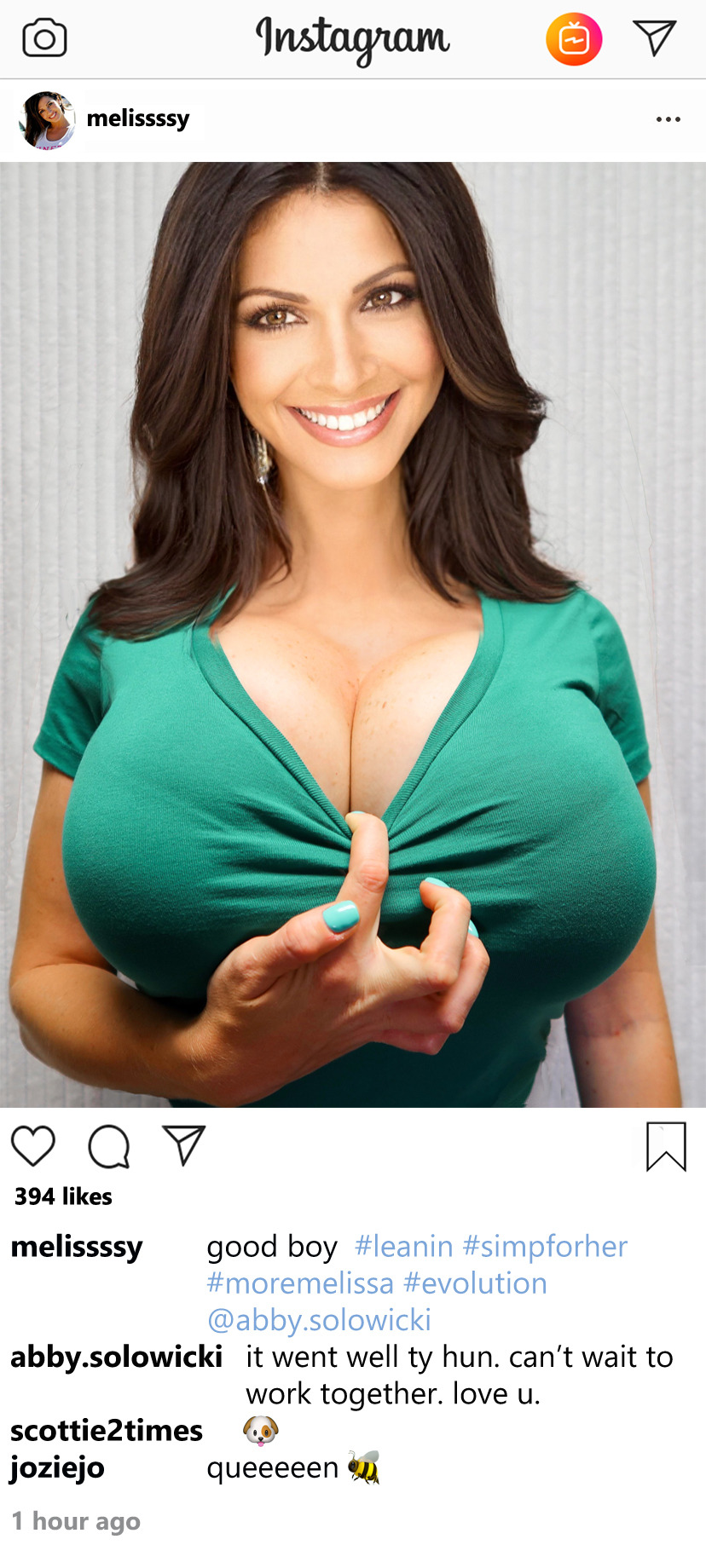
”So, tell me how it went..!” Melissa asked, tucking her fit, bare legs underneath herself on the white leather couch in her new office, attentively turning to me as she sat up. She’d summoned me to her office to have our Friday coffee, and had made us each a cup. Dressed especially informal for our “casual Fridays” in a v-neck green tee and girlish black short-shorts, her figure was on particularly luscious display today and I’d already caught myself staring...twice. “I want to hear everything!”
She was, of course, talking about my long-overdue meeting with her friend Abby, a sales rep from Evolution, a local pharmaceutical company intent on getting my practice involved in a clinical trial of their new product. Melissa, since her start as our new Office Manager, had been unusually invested in setting up a meeting between the two of us; they’d been friends for years, I gathered, and this was a favor to Abby. Little did I know that this favor would quickly spiral into a whirlpool that would threaten to drag me under and drown not only me but...well, read on.
I took a look into my “World’s Best Boss” mug - a gift from her. Far too much milk, I saw...but I think I was starting to like it that way. “Okay, uh,” I began, taking my first sip, “yesterday afternoon…”
...
…I had just escorted Mr. Kowalczyk to the desk, pushing him along in his wheelchair, helping him start to check out, when Aubrey had given me the message.
“There’s a sales rep waiting for you in your office,” she told me, eyes sparkling. Aubrey - a slim, elegant brunette - had looked especially pretty yesterday, maybe done her hair differently. We were trying her out at her new position as front desk supervisor, and she already seemed to be taking to the job well.
“The one from...uh...Melissa’s friend?” I asked, a bit confused, “Abby?” Mr Kowalczyk, hearing the name, asked about Melissa - as he had three times earlier. “She’s off today, she’s not here,” I reminded him, now for the fourth time today, as his wife appeared alongside us. Melissa had this Thursday off, apparently for some doctors’ appointments of her own.
“Yes, Abby,” Aubrey answered, turning her attention, for the moment, to our patient’s wife, “Co-pay is ten dollars, Mrs Kawalski...”
“That’s Kowal-check,” the elderly woman corrected, narrowing her eyes and apparently none-too-pleased.
“That wasn’t supposed to be until tomorrow,” I commented, immediately annoyed but feeling my pulse start to quicken, “I was going to sit down with her on Friday…”. I signed Mr. Kowalczyk’s prescription.
“It got moved up,” Aubrey told me, taking a credit card from my patient’s wife, “she’s here now…”
Why was I so nervous?
“Thank you, Mrs. Kawasaki…”
...
“...yes, sorry, I should have told you myself,” Melissa apologized, biting her lower lip, after a sip of coffee, “but it was a last minute thing. And I was still at my appointment when I heard…”
“Well, yeah, it’s okay…” I replied, eyes dropping to her still-tan thighs as she brushed at them with well-manicured fingers, tips painted a mint green to match her top, “it was just a surprise, is al-“”
“Isn’t she so pretty..??” Melissa asked, and urged me to continue my story…
...
“Thank you sooooo much for meeting with me,” Abby had greeted, immediately standing up from the chair in front of my desk as I entered the room. She stepped to shake my hand, “I’m Abby, from Evolution Pharmaceuticals.”
“Sure, sure, no problem,” I replied, noticing the confidence in her grip and the dimples in her smile. I recognized her right away from a picture Melissa had sent, early on. Maybe in her early thirties, Abby was an attractive person; lots of sales reps are. My guard was up, as it always was in these sort of sales meetings, but something in the sparkle of her eyes struck me...and her figure was nothing to sneeze at, either. I found my attitude softening already. “Melissa’s friend, right?” She had medium-length, medium-brown hair, and a nice tan complexion. Nice hips.
I guess I could give her a few minutes.
“Yes!” she answered, as we both moved to take our seats. Abby was dressed smartly, in a grey pencil skirt and sharp white blouse. “She and I met at Evolution, at our clinic, earlier this year. She’s great, so fun...”
Wait what?
“I know you’re busy, so I won’t keep you,” Abby continued, tucking her skirt beneath herself as she sat, pulling some slick promotional material from the fashionable leather bag beside her, “but I just want to introduce our product, go over some of the opportunities with you…”
What followed was both the typical sales presentation I’d seen a hundred times from different reps and at the same time one of the weirdest things I’d ever heard. From the emails and propaganda with which the company had flooded me over the past weeks, I’d read - or at least skimmed through - lots of it before. They claimed to have developed a novel general-health supplement for women; the science was still sort of hush-hush and what they could reveal was frankly a bit baffling. Normally I wouldn’t touch this sort of crap with a ten-foot pole, it all sounded so fishy at first. They were touting ambiguous improvements in mentation, endurance, strength, a whole host of other things. But I didn’t want to disappoint Melissa and, well, while I knew that the “Lean In” grants we were scheduled to receive - and frankly were going to be dependent on - were tied to us supporting female-led businesses, it soon became clear to me in talking with Abby that, um...we almost didn’t have a choice. I was starting to get the feeling that if we didn’t start working with Evolution, there’d be no money from Lean In. And so, becoming nervous, I was slowly forced to pay a bit more attention as we sat across my desk from one another, ten minutes or so into it. I was beginning to realize...we actually needed them.
But I still definitely had my doubts, my reservations, a whole load of concerns. How safe was this going to be? “And these patients,” I asked, “for the trial...the subjects. They would come from…?” It was a reasonable question. My practice was geriatric, and this was a product for younger women.
“We’d take care of that, we’d bring them in, we have a whole list of gir-...of women ready,” Abby assured me, her disarming smile doing its job, “We wouldn’t need to involve your current patients at all.” She watched me nodding, knowing she had made more than a bit of an inroad with me. “In fact, you wouldn’t even have to do much,” she continued, proceeding confidently, “we’d supply you with the new staff you’d need, we’d bring in all the supplies and equipment. We’d hook you up with our trial coordinator from corporate, she’ll organize everything. You’d just end up doing some video chats with her once in awhile.” At that Abby smiled strangely. “Her name's Brenda, you’ll like her.”
“It all sounds, uh, umm…”
Sitting there, at my desk, part of me couldn’t believe I was even considering this, still even talking to this woman. That part of me, though, wasn’t seeing what another small part of me was seeing - that the power dynamic in this conversation, between Abby and I, had gradually shifted. It was her, now, who held the upper hand. She represented the money, she was the big player. I was really the small fish here. The only thing that kept me from feeling like a nobody was knowing that my practice was somehow important to them, that they wanted me for some reason.
Why exactly was that?
“We’re a small company, but it’s not just money from Lean In that we come to the table with,” Abby continued, eyes sparkling, “we’d been bought a few years ago by a big, international group, so now we’re just ripe with resources. We can help you through tough times like you’ve been having, business down, income fading-.”
“Well, now,” I interjected, my pride rankled, “I wouldn’t say that…” I mean, I wouldn’t say it, but it was totally true. But how did she know all this?? Had she and Melissa been talking abou-
“Oh, shh, you don’t need to be embarrassed, it’s okay,” she said, “It’s nothing to be ashamed about, we understand. We know your practice is shrinking, but your needs are growing. And that’s why we’re growing too, so we can help nurture you, provide for you.”
This was humiliating as fuck but...why was I getting hard? Yes, Abby was attractive, blouse just a little too tight, chest just a little bigger than necessary. She was pretty, yes. No, actually...now with all the power in the room centered on her, with the strength she represented, she was downright hot. And the scenario she was laying out for me, this relationship I’d have with her big, female corporation? It felt positively...maternal. And, it was beginning to feel like a foregone conclusion, that I would be taken under their skirts. But again - why was I getting hard?
“Evolution will take good care of you,” Abby assured me, her voice growing subtly more tender, as if reading my thoughts, “and as we get bigger, and grow, we’ll carry you along with us. We can tuck you in to our...corporate structure. You’ll be safe, there, close to us.”
If I hadn’t noticed the outline of her bra beneath her blouse before, I was noticing it now.
“Would you like that?” she asked, probingly.
“Uhh…”
“We’d make sure you don’t get left behind, as the world changes,” she continued, “because the world is changing, Dr. J, and we think our product is going to help women succeed in it. Don’t you want to be there with us?”
“Uhhhh…”
Seeing my anxiety starting to get the better of me, Abby smiled disarmingly. “You probably need to talk to Melissa about it, before deciding on the trial,” she began again, “right?”
Oh my god I couldn’t believe it, how demeaning that was, but I knew it was my out - for now. ”yeah I guess I probably should…” I said, weakly…
“Of course you do…” Abby smiled.
…
“So…<nnngh>...” Melissa all but groaned, inching closer to me on the couch, “you wanted my approval, first?”
As I had recounted my story, described the meeting to her, Melissa had slowly, gradually, become visibly more excited, completely engaged. She’d asked me to repeat details, recount conversation, all the while gazing intently into my face and moving intimately closer to me on the soft leather couch in her office. Her curves, her larger body had me slowly retreating, backing up as best I could. An arm rested on the back of the couch behind me.
“w-well I, uh…” I stammered, eyes dropping again for a furtive glance at her thighs, hips, her tiny waist. I was, at this point, already overtaken by the scent of her perfume. “it’s uh-“
“It’s like you’re recognizing you need my help, isn’t it?” she asked, a strange huskiness in her voice, “Isn’t it?? That you have an easier time when I make the decisions for you??”
I couldn’t say anything, looking at her. I was tongue-tied realizing, in that moment, how assertive women now framed the borders of my life, affected my daily choices. And they were, if anything, all pushing me into the clutches of other powerful women. If I took this money, allowed this clinical trial to set root in my office, it would mean becoming dependent on both Evolution and Lean In. Lean In, I was learning, was a well-connected, obviously well-funded female empowerment organization, one that seemed determined to get women into places of influence and strengthen them while they’re there. And Evolution Pharmaceuticals was not just the rinky-dink pill pop-up that I’d assumed it was, but rather a small piece of some larger player...and maybe I’m just being paranoid, but probably also controlled by women. If I took this money, I felt like it would be sucking from the big collective teat of the country’s - and perhaps the world’s - most powerful alpha females.
“I, uh…” I began, forgetting where I was, “yeah…”
“Omigod I am SO happy with you right now..!!” she suddenly, finally gushed, sitting up taller, jumping towards me and abruptly throwing her arms around me. Strong hands behind my head now pulled my face to her chest. “You are such a good boss!”
“mmmrf!”
Embracing me to her bosom, she squealed, and hugged me tighter. Soft breast squashed into my face, my head plastered to Melissa's big left boob.
Oh my god what is she doing?!? I panicked, arms flailing helplessly as I heard her start to laugh. Despite my struggles, she held me firm - if anything, holding me even tighter still.
“M-m-m-Mulithhah!” I tried, voice muffled by the mushy mass mashed into my mouth.
“Shhhhh…!” she giggled, “I can’t help myself, I need to hug you!” Pressing herself into me, she moaned in delight. “Hug hug hug! I need to show you what a good boy you are!!”
The warmth, the softness of her breast was overwhelming, and as she held me firm I - despite myself - started to calm, give myself up to her massive tit. “mmmmf…” I tried again, this time my complaint sounding more like a little sigh.
She looked down at me, quietening down herself. When she spoke again, her voice had softened.
“That okay, sweetie?” she purred, cupping my head from behind with one palm as the other moved into my hair, “Can you breathe down there?”
I groaned something, something in assent and - god help me - rubbed my nose into her.
She giggled.
“There you go…” she cooed, now petting my head, “all good now, all good. Just breathe...”
I sighed again, every breath I took full of her perfume, the scent of her skin. I heard, through her chest, her cooing little praises.
“Good boy...good boy…” she lauded, enveloping me with affection. She was peering down at me, I knew, though my eyes had closed already. I felt her ready herself, and winced in shame even before she asked me the question that I knew was coming:
”So, with the trial…” she asked, “what have we decided?”
=================================================
Thanks so much to the incomparably amazing Dani Doreen for the image. We're so proud to have her onboard as our resident "from the neck down" Melissa and can't wait to work with her some more. She's so awesome and I'd recommend everyone check out her GTS/SM content:
Dani Doreen’s OnlyFans
https://onlyfans.com/danidoreen
97 notes
·
View notes
Text
Mint Ice Cream & Bubblegum Kisses - Chapter Three
(Bucky Barnes x Single Dad!Reader)
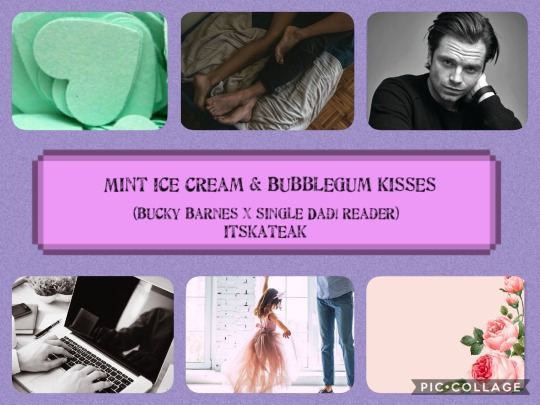
Series Summary: Y/N L/N works as an intel specialist at the Avenger’s Compound. He scans chatter on the international - and intergalactic - level for any information that might be helpful to the Avengers and other agents. But he’s also a single father to a beautiful eight-year-old girl: Angelica L/N. It’s tough raising a little girl on his own and working a full-time job, but he’s managing. A promotion has him launched up in rank at the Compound, leading him to work directly with the Avengers team. The only problem is it’s a 24/7 job. Life around the compound gets a little strange when his daughter is added to the mix of enhanced humans and ex-assassins.
Chapter Summary: Angelica seems to be settling in nicely and Y/N is still getting used to having his kid around in his workplace. Especially when she's known to be a little mischievous.
Word Count: 2.6
Warnings: Fluff, pranks, like four swear words, discussion of PTSD but it's very brief. Like very brief.
A/N: this is in light of me recently being able to play Black Widow for work. as I said in the last chapter, things will be moving a lot quicker
Masterlist
Taglist is open! PM me, send an ask, or @ me on a chapter to let me know you’d like to be tagged! Strikethrough means I couldn’t tag you, but I will send you a message to let you know :)
✿°•∘ɷ∘•°✿ ... ✿°•∘ɷ∘•°✿ ... ✿°•∘ɷ∘•°✿
Angelica snuck down the hall toward the common room, trying to keep her steps light or as close to silent as she could get them. She resisted the urge to look up at the ceiling, knowing Peter was just above her. This was a new system they were trying out where Angelica went first as a decoy and Peter would follow for the proper scare.
They had a shared love of harmless pranks and therefore had started a small prank war on the other inhabitants of the compound. At first, it had only been against each other, but they figured out that they could do way more if they teamed up.
Y/N had warned them not to do anything too bad, knowing how some of the people in the compound were affected by sudden surprises. He'd sat Angelica down and explained what Post Traumatic Stress Disorder was and how what she might perceive as a harmless trick might trigger something or cause a breakdown.
She had understood and in her very solemn way promised to run her more "fear factor" ideas by him first just to be safe. When he did shut down her ideas, she never argued and dropped the plan. Confuse not abuse was their motto.
Y/N, meanwhile, was working in his office, watching text scroll across his screen. There was a lot less than when he worked general intel, but that didn't mean he could focus any less. Any small detail could make or break whether the information was crucial or not. Everything that came across his screen was very important, but some things had to be taken note of.
He had mastered reading and writing at the same time, his shorthand notes making no sense to anyone but him. He'd learned that the week before when he passed the intel off to Tony and he just stared blankly at the paper. Now, he translated his notes so others could understand. Sometimes, he couldn't tell what he was meaning to say.
A transmission from The Benatar came through and he pulled his seat closer. It was just a simple message about their whereabouts and where they were headed. Gamora had signed it off, saying that it was nice to meet him and that whenever they stopped by next, they had to properly meet. He wrote down their message before typing a message in response.
Received. Glad to know you all are safe and having fun up there. Stop by anytime you want. My daughter would be overjoyed to meet all of you.
- Y/N
Y/N leaned back in his chair, taking up a pen to make notes as information on underground movements possibly related to Hydra agents flooded in. More bases had been popping up recently, despite Steve's attempts to drag them all down in the past. Instead of being against the Winter Soldier, though, he was with them. Which gave them the upper hand since he knew their inner workings.
A knock on his office door made him glance up. Bruce stood in the doorframe, his knuckles still against the wood of the door. He gave a shy smile. "Am I interrupting?"
"Not at all. Come on in, Bruce." Y/N set his pen down and rolled his chair to the end of his desk. "What can I do you for?"
"I just came by to see how you were settling in. We haven't talked much since you were offered the promotion." Bruce sat tentatively on the couch, looking very unsure of himself.
"Things have been going well. It's nice of you to stop by, though." Y/N swiveled back and forth casually. "I like having my own office."
"It's great, huh? I have a whole lab to myself most of the time. Tony invades my space once in a blue moon but he has his own lab somewhere else." Bruce relaxed a little, laughing gently.
"Angelica breaks the peace at least twice a day, but she's my kid so it's not as annoying. Except when I really have to focus. Then I kick her out for a bit." He said with a lopsided grin.
"She wanders into my lab every so often to say hello or ask for help with her science homework. She's lovely." Bruce smiled. "Very bright."
"Yeah, she is...I can't keep up with her at this point. She's going to surpass my skills soon." He chuckled, shaking his head. "Good thing she's got you guys to check her science. I barely passed it in high school."
"Really? I wouldn't have expected that from you." Bruce said.
"I was okay up through my sophomore year but once I hit physics, I lost all understanding. Algebra was never my strong suit, either." Y/N rolled his eyes. Bruce was going to respond when shouting down the hall caught their attention.
Peter sprinted by the office, yelling over his shoulder: "Every man for himself!"
Angelica was a few seconds behind him and she slid into her father's office. "Hide me! Quick!" She slipped around his desk and curled up underneath it.
"Kiddo, what are you doing?" Y/N asked, giving her an amused look.
"Shhhh!" She shushed him and pressed herself into the corner, covering her mouth to hide her giggles.
"Peter Benjamin Parker! Angelica Ellaine L/N! Get your butts back here!" Natasha seemed to be the source of the yelling as she stormed down the hall. She paused at the door to the office, leaning casually in the doorframe. "Hey, boys. You seen a tall spider or a little monster recently?"
Angelica shook her head vigorously in her father's peripheral vision. He pretended not to see her, making sure not to look anywhere close to her location. "Snitches don't get cookies." She whispered as quietly as possible.
"What'd she do now?" Y/N asked. He had to uphold the Code. Snitches don't get cookies, and he'd never betray his daughter.
"She tried to jumpscare me and then Peter swung down from the ceiling and scared the hell out of me." Nat folded her arms over her chest. "So, I'm trying to grab both of them to dump them in the pool."
Y/N laughed and shook his head. "I haven't seen her, except for a few seconds ago. She ran by on Pete's heels."
"Bruce, have you seen them?" Nat turned her gaze to the scientist, who suddenly grew visibly nervous.
"Uh," He glanced at Y/N. "They ran by just a minute ago."
"Uh-huh...Well, I guess I'll just keep looking." Nat pushed off the doorway and started to leave before poking her head back in. "You're still a terrible liar, Bruce." She winked and disappeared.
"Is it safe?" Angelica whispered.
"Yep. Come on out." Y/N rolled back a little bit to give her space to move out. "Good luck out there, kiddo. Watch your back."
"Thank you, Mr. Banner! You deserve a cookie." Angelica smiled at Bruce, the full personification of the smiley-face emoticon. She snuck to the doorway and glanced down the hall before turning the same way Peter had run.
"How long do you think it'll be?" Y/N asked, returning his chair to its proper place.
"Until what?"
His question was answered by a scream from down the hall that devolved into squealing laughter. There was some indiscernible shouting from three different people.
"Until Nat caught her at the corner." Y/N watched as Nat went running by, laughing, with Angelica thrown over her shoulder.
"Peter! Help! She got me!" Angelica yelled through giggles, hand extended out behind Nat's back.
"Angelica! No!" Peter followed, reaching for her. "Nat, give her back!"
Y/N shook his head fondly as the chaos grew quieter the farther they got. "We're settling in well, as you can see. She's making friends and creating chaos. I'd be worried if she wasn't."
"Did she always play pranks on you?" Bruce asked, smiling uncontrollably.
"On more than one occasion, I found shaving cream in my shoes." Y/N wrinkled his nose up at the memories. He had hated that feeling of shaving cream squeezing between his toes in his socks.
"Gross. She and Peter were bound to get along well, then." Bruce glanced at the clock and got to his feet. "I should let you get back to work. If Angelica has a science or math question, you can totally send her to me."
"Thanks, Bruce. You're a genius." Y/N rolled back over to his work station, shaking his mouse to wake his computer up.
"I wouldn't say that," Bruce said as he walked backward out of the room, pausing in the doorway.
"Don't sell yourself short, Bruce! You're totally a genius." Y/N pointed with his pen, smiling as he spoke.
Bruce ducked his head sheepishly and nodded before he left the office.
Y/N returned to his screen, pulling his notes back into reach, and scanned the text again. Another couple of hours before lunch.
✿°•∘ɷ∘•°✿ ... ✿°•∘ɷ∘•°✿ ... ✿°•∘ɷ∘•°✿
"Your kid." Tony suddenly popped in, holding his phone out to show Y/N what was on it. "Your kid keeps changing my phone background."
Y/N looked up and glanced at the screen before bursting into laughter. It was a photo of a sloth dressed as an astronaut. In the past year, she'd managed to change her father's phone background and laptop wallpaper to that stupid sloth photo without his knowledge at least sixteen times.
"Why?" Tony asked, defeated. "Why is she doing this?"
"She read about someone online who did the same thing to their parents and she took inspiration. I'm happy to see she's moved on to other targets." Y/N shook his head in amusement. "Shouldn't your phone be super secure or something?"
"It is! I don't understand how she keeps doing it. I've changed my password eight times and even had Friday monitor any attempts to hack in." Tony sank down onto the couch, tossing his phone beside him.
"Well, she definitely can't hack things. She's smart, but not that smart. Usually, a password change will keep her from trying again." Y/N swiveled to the side, head cocked.
"This is the second time today," Tony grumbled, brows furrowed. "I don't get it."
"Well, you're the genius here." Y/N snorted, glancing at his screen again. "If my kid's not the one hacking your phone, who is?"
"Oh, my god," Tony said, standing quickly. He rushed to leave but paused in the door. "You're the genius, Y/N."
Y/N arched a brow in mild intrigue. "Uh-huh. You're welcome?"
Tony flashed a smile before turning. "Peter Benjamin Parker, how many times have I told you not to hack into my stuff!" He shouted as he walked down the hall.
"Kid, you're sowing chaos." Y/N glanced at his daughter curled up under his desk.
"Huh?" Angelica looked up from her book, confused. "What's going on?"
"Peter hacked Tony's phone and changed his phone background to that astronaut sloth." He responded, returning to his work.
"Oh, Pete didn't do that." She said, turning her page. "Mr. Banner did after seeing us do it. Somethin' about getting back at him for leaving crumbs all over his lab."
Distant yelling floated down the hall to the office. High-pitched 'Mr. Stark, it wasn't me!'s were the only things that could be properly made out. Angelica made eye-contact with her father.
"Should I?" She asked.
"Nah." Y/N said and they both started to snicker. "He's a big boy. He can take care of himself."
Angelica giggled and returned her attention to her book.
✿°•∘ɷ∘•°✿ ... ✿°•∘ɷ∘•°✿ ... ✿°•∘ɷ∘•°✿
Y/N pulled himself out of the pool, shaking his head to fling water off his face. He hadn't gotten to use the facilities yet since they moved in. The pool was really nice - way better than any of the public pools he'd been to. He used to swim once a week but work got in the way. Now that it was Sunday, he could enjoy the free access for as long as he wanted.
He grabbed a towel, dried his hair and face, and walked to the locker room. His shirt was folded up on a bench with his shoes sitting beside it. He dried the rest of his body off and pulled his shirt on. He slipped his feet into his shoes and froze.
"Dammit, Angelica!" Y/N shouted as shaving cream seeped between his toes and spilled over the top of his feet. He grimaced and kicked his shoes off, quickly wiping the shaving cream off. He picked up his shoes and went storming off to find his daughter.
✿°•∘ɷ∘•°✿ ... ✿°•∘ɷ∘•°✿ ... ✿°•∘ɷ∘•°✿
"Hey, Y/N. Sorry to intrude after hours." Sam knocked on the doorframe to his bedroom.
"Hey, Sam. No worries." Y/N looked up from his book and set it aside. "What's up?"
"Bucky and Steve are coming back really early tomorrow morning. Like, three in the morning early." He wrinkled his nose up. "They might have sensitive intel from their raid so Tony's asked you to be in office by the time they get back."
"I won't yell at you since you're just the messenger, but really?!" Y/N groaned, running a hand over his face. If he wasn't a morning person before, he surely wouldn't be a happy camper at such an early hour. "Guess my plans to stay up reading have been shot."
"Sorry, man. It's what the boss wants. But really, blame Barnes because he wanted to get back as soon as possible." Sam crossed his arms and shrugged. "Always his fault if somethin' goes wrong. Man brings bad luck wherever he goes."
"I think that's a little harsh and biased. I haven't even met the guy, yet." Y/N leaned over to set his book on the nightstand. He snagged his phone and started to set an alarm or two for the morning.
"I'm sure you've heard all the rumors. Some of them are true - about him being grouchy and an anti-social person - but a good majority of the rumors is just scuttlebutt. Er, gossip. He's got a good heart, but man he can be annoying as hell," Sam smiled fondly, though he tried not to look it.
"Sounds about right," Y/N chuckled, sliding his charging phone underneath his pillow.
"He's really slow to trust and open up, so if he's a little closed off and rough around the edges, it's not you. It's all him, so don't worry." Sam explained. "Might want to ease him into meeting the little rascal, though. He's skittish on his bad days and after missions."
"I took the liberty of reading over all of the team's files so I get why. Thanks for letting me know. I should get some sleep so I'm not as grumpy in the morning when I greet them." Y/N yawned on accident, covering his mouth with his hand.
"No problem. I'll let you get some rest." Sam reached forward and closed the door as he left.
Y/N turned out the light and sank down in bed, drawing the covers up. He had at least four extra blankets just for the weight. He liked having the excess weight since it made him feel secure and grounded.
"Hey, Friday?"
"Yes, Mr. L/N?"
"If I don't wake up from my alarms, please wake me."
"Of course."
Y/N fell asleep shortly afterward, not fully aware of how tired he had been. Moving and getting used to the new environment had really taken it out of him and his body was begging to catch up. A shame he'd only get five hours before being dragged from bed. That was going to be one of the very few downsides of this new job.
✿°•∘ɷ∘•°✿ ... ✿°•∘ɷ∘•°✿ ... ✿°•∘ɷ∘•°✿
Taglist- @supernaturalwintersoldier @shadowolf993 @myybebe
#mint ice cream & bubblegum kisses#bucky barnes#james buchanan barnes#bucky barnes x reader#bucky barnes x male reader#bucky barnes x single dad!reader#bucky barnes fanfiction#mcu fanfiction#marvel fanfiction
74 notes
·
View notes
Text
[TRANS] WayV’s interview with ELLE Korea May 2020 issue!

— Kun
A suffering leader, everyone's Kun — With a meticulous personality. The pros and cons would be: I think I am the leader thanks to my sense of responsibility and delicacy. [But] when there is too much to take care of, it is a bit cumbersome. There’s no member who gives me a hard time because they all pick on me one by one (laughs). If I had to introduce my hometown, Fujian Province, it's a quiet city with clean air and few people. Many people come to visit because the mountains and the lakes are beautiful. When I think about nature, I start missing my hometown. At school, I was the head of the student council's entertainment department. I might look like a serious person since the members are so active and mischievous, but I'm also a fun person. Times when I feel like we’re one team are when you know what the others are thinking just by the look in their eyes and, when we dance and the movements are 'synchronised'. WayV to me is the comfort of being able to share everything with each other. All the members worry a lot about music so a lot of ideas come out every time we hear new music. It is certainly an advantage that all seven have a lot of desire. I have a bright young voice, but my desire as a vocalist is to have a thicker and more mature voice these days. Wouldn't it suit dance songs that match our [team's] style more than ballads. I graduated in Practical Music. If there is a song I want to arrange: I'm still trying to look for my style while listening to various songs. I want to challenge not only the arrangement but also the composition. I am a good cook. The dishes I recently made for the members are the dishes that I learned from the main chef of the company while I practiced them [on the members]. The menu with the biggest reaction recently was DongPo Pork. When I can't sleep, I deliberately watch low-rated movies and these days, I watch a four-hour-long landscape video shot from a train driver's perspective. It makes me fall asleep really fast (laughs). The most memorable stage after debuting was as expected, MAMA 2019. When I was giving the award speech, my hand that was holding the microphone was shaking and it was all captured [on camera]. What I want to say to myself in hard times is to be confident! The moment you lose your confidence, everything becomes more difficult. The mindset I don't want to lose is to be grateful. Everything I do right now is impossible to do by myself. This is the most important. To Winwin: who has known me the longest among the members! I hope you always take on challenges with courage because I will always be there beside you to support you. Also, all the members know that you are cute.
— Lucas
Healthy energy, hot Lucas — Between a boy and a man, I feel closer to 100% boy! I don't think I feel mature enough. [Maybe I’m just like] a baby who wants to be a man (laughs). The most impressive man to me is a responsible person. And also, a man who gives everything to his loved ones. Having an attractive rapping sound because of a low and husky voice. My desire to sing is big! I want to sing a sad song. I've heard from people around me that a calm song suits my voice. Like the calm songs of Paul Kim I normally listen to too. My favorite song is "Take Off, The killing point is the dance break, with the powerful guitar riff. Emotion is what is the most important on stage. I believe each song has its own soul, and it is important to immerse yourself. My role in the team is positive energy. Although always looking bright, surprisingly, I have a lot of thoughts. Yesterday too, I had a lot of thoughts before going to bed, so it took me a while to fall asleep. Not long ago, Kun hyung played me a song he had composed and so many ideas came up so I wrote them down and sent it to him. WayV to me is a friendship that feels really deep even though it’s been only a year since I made a debut with the people I love so much. So much that when we come back from a schedule, as we laugh and talk together, the stress will suddenly be gone. The most important thing in a team is to have sincere conversations with each other to understand each other's differences. Only then can we get along well because of the wider understanding. Having appeared in a number of familiar variety shows like the Chinese version of <Running Man> <Let's Run Season 3> I like that I can go to various places the most. It's also a special opportunity to meet people with other jobs and not only artists. I think I'm often called/casted [for these shows] because of my sincere youthful reactions. The mindset I don't want to lose is the promise I made when I debuted to be a good influence on people. That's what I always keep in mind. I want to be a person who always gives positive influence to people, family, and fans around me. To Yangyang: who I know is really smart, you're still a cute little brother to me (laughs)
— Winwin A quiet presence, Winwin — In the reality show <Dream Plan>, mingling well with the elders in the village was impressive. Special trick behind it was thanking them for looking out for me! Since they were all kind natured, I guess treating them with sincerity looked good. When Lucas and I visited their home, we got served a meal and received a warm welcome. A performance video of Ten and I has been released. As a dancer, Ten is a member whose strength is being versatile. He helps the members at dance practices a lot. I’ve learned dancing in a special dance school. At the time I was the shortest and least talkative kid until I grew taller in high school. I’ve spent most of the time practicing alone. Chinese dance is similar to modern dance mixed with ballet. Learning the choreography is fast and it’s an advantage to be skillful in tumbling. I would like to properly showcase a modern dance at a concert someday. When I’m on the stage what I care about the most is my gestures and facial expression. During ‘Take Off’ promotions, the gestures and facial expressions I did during my part varied from stage to stage. I hear that I’m ‘pure’ a lot. A new charm that I want to have: our fans call me ‘Baby Chick’. I want to showcase more of an ‘eagle’ image, so I cut my hair short. Isn’t it similar to Park Saeroy (laugh). Something that makes me angry, although I normally have a good temper is being unsatisfied with stage performance to the point I can’t sleep on that day. But it’s okay to just take a nap. I just need to do better. The most memorable moment in WayV promotions was receiving the Best New Asian Artist Award at the MAMAs, it was the first time we’ve gotten an award together so I was very happy. The reason why I went to Beijing on my own as a middle school student seems to be fate. I passed my exams without much determination, left my hometown and went to school in Beijing where I was noticed and then debuted. Coincidence became fate. To me WayV is a path that we’re talking together, a team with a lot of growth potential. I’d like it if the younger members came to me whenever they need someone. I feel our fans love and support the most when: I’m always amazed and grateful for our fans hearts. All of the people who always look out for us even when we’re not promoting any albums and who support us are an immense source of strength. Success to me is when more people get to know us and we get to perform in many different countries. I want to think about my personal success after my team’s success. To Kun: when members want advice, we reach out to Kun first before our families. He knows a lot, can do a lot, and is a person we can depend on.
— Ten
Ten who is curious about what's next rather than what’s now — The secret to adapting well everywhere is attending an international school. I had friends of various nationalities and I also traveled a lot. Wherever I went, I went to see the common [places] first. Learning an unfamiliar culture is fun. I’m learning Thai, English, Korean, Japanese and now working hard at learning Chinese. I memorize expressions that I can use while watching Chinese variety shows and dramas. Although it's still difficult to read the buzzwords and hanja. The most important thing as a performer, and what makes you an outstanding dancer, is to have your own style while not being trapped by masculinity and femininity. I am different now from a few years ago and I'm trying to challenge myself by being flexible in various aspects. What I've learned since debut is, in the case of WayV, that when you work with various genres the main concern is the vocal style and with SuperM, I learned about the importance of performance through the activities [we did]. 'It's important to dance well, but you must also have your own [style]', 'think about what you want to express in front of the camera, but you must be faithful to your feelings on every stage in order to develop [yourself]' is the advice I received from the Hyungs (Baekhyun, Kai, Taemin). For the dance video that I did together with Winwin, the concept, music, settings, and outfits were all decided by us together without the company's advice. I came to realize the difficulties of being a staff member (laughs). I can [now] see the wider picture and more details. I like poetry too. I think poetry expresses emotions. It helps me understand the world and the society as a person and not as an artist. The lyrics of my 2nd solo song 'New Heroes' feel like an autobiography. If 'Dream in a Dream' was all about the performance then 'New Heroes' is a song about the time spent committing [to something] and I thought anyone can sympathize with that. The [original] lyrics were so great that I asked them not to change it and to just go with it. I want to write lyrics myself someday. The kind of person I want to be is [someone who] always tries to go with the flow as I think that making plans and setting expectations can make it more difficult on yourself. I hope I could be a person who can leave a good impact on others. WayV to me is just like a family who always does everything together and takes care of each other asking ‘have you already eaten?’. Everyone has an open mind to try and accept new challenges. During the 'Moonwalk' promotion period, I was kinda surprised how well we got along. Having received recognition for my skills since debut. The times when the expectations are high are: Art and languages too are ever-evolving disciplines, so it's not easy to keep up. Nevertheless, there are self-expectations and anticipations to show a new side of myself. I will work hard (laughs). I still play Pokemon Go and I'm waiting for the June update. I will catch a lot of new Pokemon again! To Xiaojun: with whom I saw Harry Potter together yesterday! Let's make an appearance in Harry Potter when there is a reboot.
— Hendery
Flexible midfielder, Hendery — Something I’ve gotten into recently is practicing playing drums. Kun hyung is cooking a lot lately so I’ve been reviewing the food too. The other day he made kimchi jjigae so good that it even got an approval from manager hyung. My favourite track is ‘Take Off’. We filmed the music video in Ukraine and spent loads of happy times together, so I feel happier whenever I listen to it. Something I’ve improved on since debut is that recording songs takes less time. When I hear a member of staff say ‘Is this really Hendery’s voice?’ I feel proud of myself. The charm of my vocal is: I’m still looking for it, but I feel like my rap sounds nice when I spice it up with a little melody. Good at giving advice to our members. A tip to giving good advice is: it’s important to have helping and not making decisions in mind. Talk about both bad and good points about the A and B. The secret to always looking like I’m at peace is my parents always telling me ‘Your happiness is the most important. You always have a home to come back to, so work as much as you can enjoy’, thanks to them I grew up as someone with little stress or worries. Mindset that I don’t want to lose is the excitement before going on stage. I think the most important thing for an artist is their greed for performing. When I get on stage the most important is interacting with fans. The most memorable stage was our Korean debut on <Show! Champion>. I couldn’t believe we’re performing Chinese songs in Korea. I was so overwhelmed to see our fans welcoming us so enthusiastically even though they didn’t understand what we were saying. I opened an instagram account recently. My posting plan is ‘This is where I am‘ ‘I am filming today’. I want to showcase my daily self. I hope our fans can smile for a brief moment when they see the pics I had the most fun taking. To me WayV is: I feel empty when I go away to see my family for a little. Every time that happens I facetime them to relieve the sadness. Lucas is the member who picks up the most (laugh). To Lucas: No matter how busy we get, even if we become grandpas, I’ll always be by your side. It’s something I want to say to all of the members, but Lucas is a friend I'm especially attached to so I really wanted to say this.
— Yangyang
Infinite potential, bold maknae Yangyang — I speak Chinese, German, English Korean and Spanish. Great language skills are useful when you travel. Whenever I talk with friends of various nationalities, I think it's fortunate that I can speak many languages. In our team alone, it's full [with people who speak] Chinese, Thai, English, and Korean (laughs). My role in the team is being the happy virus! Although of course, the hyungs think I'm a maknae that requires a lot of energy from them. WayV to me is a high tension team that can deliver strong and positive energy. If someone shows a slight sign of exhaustion, we immediately stick together and somehow infect each other with energy. I think that such energy is conveyed to fans on stage. If I have learned anything from living together with the members [it would be] the habit I have developed to control my greed and to care for others. I'm used to looking at the other's feelings now before doing something. My favorite song is ‘King of Hearts’, because I participated in writing the lyrics. I also love 'Love Talk' from the 2nd mini album. It is a charming song that is sweet and sexy but has a way to make your body move. My ambition as a rapper is the flow. Because I think this is the aspect that determines the impression of a song from the listener's point of view. I want to be a multi-talented person who is good at not only rapping but also dancing, singing, and writing lyrics. I've always had a lot of ambition. The attractive part of writing lyrics is that I can tell my story, since from a long time ago, I wrote lyrics little by little and it's always fun work. I want to steadily keep doing it. I like Virgil Ablo and Demna Gvasalia, and the fashion icon who caught my eye these days is Mike Amirie. I am drawn to people who have a simple yet clear style. The same goes for musicians. I like people who have a clear style like Travis Scott and A$AP Rocky. I’ve said 'I like who I am' before. Instances when I am especially like myself is when I'm confident. When I have confidence and want to show off, I can show much more than my actual skills. I use SNS to check on NBA and fashion news. I see the news on sneakers I'm looking forward to fast. Surprisingly, I don't look up anything about me [but] when a stage or performance is over I do look up the reactions. Most of them are good, so every time I read, I get energized. To Hendery: hyung, you seem to really get into gaming, but don't try too hard (laughs).
— Xiaojun
Warm voice, Xiaojun — Something I’m into these days is practicing the songs that will be included in the next album that we are preparing for. Before debuting, I only sang my favorite ballad song, but nowadays, I want to sing songs of other genres such as R&B. I've been uploading videos of me singing on my personal Instagram. My favorite song is ‘Face to Face’. My heart warms up every time I hear it. I really like the lyrics ‘You won’t be lonely because I’ll be your strength, I won’t let you cope with your wounds alone in silence’. The keywords that describe me are kind. Friendly. Positive. I often say ‘I wish my songs were healing different people’. The way I heal myself is: my heart calms down when I look at pictures with many memories sealed in them. I take a lot of pictures of the scenery and especially when I look at the pictures of my hometown in Guangdong I feel healed. The reason behind my strong sensitivity is the big influence of my dad who’s a singer and my older brother. Ever since I was little we would often watch movies together. I graduated with a musical major. My greed for musicals is: I’ll surely do it again later. I like starring in musicals but one day I’d like to make my own. A musical piece I’d like to recommend is <Dear Evan Hansen> who won at Tony Awards and Grammys. It’s a warm story about a lonely high school boy suffering from social anxiety disorder, who is working on his trauma and healing from the pain. My way of dealing with stress is quiet time on my own. Just like positive energy, negative energy is easily spread to others, so I’d rather be alone. A memory I really want to make is a trip, I promised to go on before debuting, with the members. The destination is still undecided. The kind of team member I want to be is a silent supporter. It would be nice if I can be 'my people/dearest' to others. Something I want to do this year is to have an event for the fans. I like to surprise friends or throw surprise birthday parties. I think fans will love it if we would do a guerilla performance. I told you here so I have to throw [that idea] away and I will prepare something else (laughs). To Ten: You are one of the 'Hyung-line', and you Korean is the best so there are many times you have to lead us. Don't carry everything on your own and sometimes lean on us! The same goes for Kun hyung.
t/n: Due to the structure of this interview there might be inaccuracies as many things only made sense in Korean but sounded kinda awkward in English (more so compared to other translations we did). We tried our best to convey what they meant, but please keep this in mind when reading this interview.
Translation: Alex, Esmee @ FY! NCT (NCTINFO) | Source: ELLE Korea Scans — Do not repost or take out without our permission!
362 notes
·
View notes
Text
Why I don’t give a fuck about canon
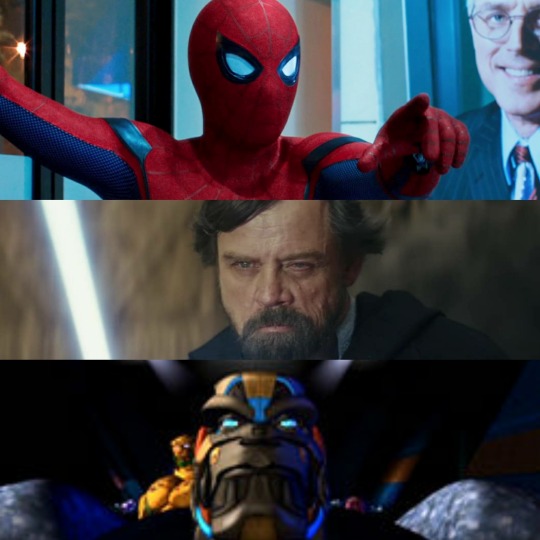
Recently, after randomly coming across some dope pictures of Transformer toys on Instagram that gave me a strong case of nostalgia, I was inspired to revisit an old childhood favorite in “Beast Wars.”
“Beast Wars,” in case you never watched or heard of it as a kid, is the continuation of the Transformer’s story set in the future as descendants of the Auotobots and Decepticons, the Maximals and Predacons, respectively, accidentally travel to prehistoric Earth to continue a centuries long battle between the two opposing factions.
There’s a lot of to digest there, so I’m not going to go into extreme detail over the plot, but the cast features colorful characters such as Optimus Primal, Cheetor, Rattrap, Dinobot and Megatron to name a few. They all have interesting and distinct personalities and generally play well off each other. It was a big part of my childhood and I collected an ungodly amount of their toys back in the day.
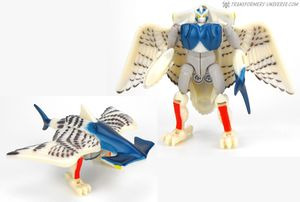
(This was my first ever Beast Wars toy and I think it’s beautiful.)
My rewatch though was…a mixed bag to say the least. The graphics have not aged well. The adventure of the week setup of the plot was repetitive and lacked real character development at times. There were characters that were added in last minute to the show clearly to promote a new action figure over the story on numerous occasions. Though I found the humor to still be pretty good, the action was stale and just lacked high stakes most of the time, save for a few episodes.
I was not shocked it didn’t land terribly well on my rewatch but you know what did? “Beast Machines!”

“Beast Machines” was the follow-up to Beast Wars that had the Maximals fighting on Cybertron where Megatron has taken control of the whole planet using a virus that changes Transformers into mindless drones to do his bidding. The remaining Maximals manage to survive however after Optimus discovers The Oracle which reformats them into animal robot hybrids that are both mechanical and biological. This sets them on a quest to stop Megatron and bring biological and mechanical balance to Cybertron once and for all.
The series is much more narrative based than the previous as it follows a steady trajectory to its epic conclusion. The animation is much sharper, and the soundtrack is fun as hell to listen to still. The pacing is much faster as the stakes couldn’t be higher for the Maximals and all the old characters from the previous grow in interesting ways and develop into more organic people (literally in some ways). Optimus is a more hardcore and emotionally damaged leader and Megatron goes from being something of a punchline in the previous series to a far more menacing and calculating nemesis. The story touches on themes of balance, authoritarianism, PTSD, love and reunion to name a few and for a kids’ show it is, dare I say…more than meets the eye.
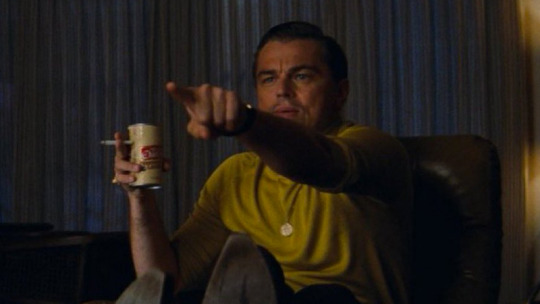
I absolutely loved it as a kid and I might actually love it even more as an adult, so it was shocking for me, to say the least, when I read further into the history of the show, that a lot of fans straight up rejected it back in the day.
Common complaints I came across were they didn’t like how characters, such as Ratrap especially, “changed.” They didn’t like the new bio/mechanical Maximals and couldn’t believe that Cybertron was once an organic world.
Their big reason (in just about every forum and video I saw about it)? It didn’t adhere to “canon.”
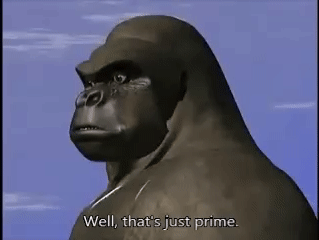
Now, I’ll start this by saying there is no objective way to critique or even not critique a story. People can like or hate something for a variety of reasons that don’t follow a strict logical pattern. Gods know I have a few questionable/divisive favorites in my catalogue that I have written about here that are based on abstract ideas and personal experiences.

(The Matrix Reloaded is still great btw)
But I will say, if you judge a mega franchise’s latest entry on how well it is supported by established canon it is, in my opinion, a flawed way to critique a work of fiction.
Canon, sometimes referred to as “lore” by fans, is most often applied and used to describe the long running back stories of franchises that stretch beyond just the main books, movies or series, or even the original narrative of the plot. Star Wars, Star Trek, Lord of the Rings, and to a certain extent Harry Potter, all fall into this camp of series with so many interconnected parts, with more than one main character featured in each, that fans follow along this canon like ancient monks studying scripture and history books.
And they can be just as fanatical and over zealous about it.
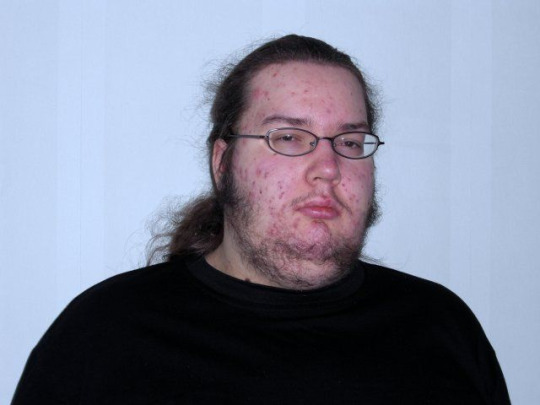
(I wish they were more fanatical about proper hygiene or at least deodorant...)
My problem with the ways fans often view canon is that their conceptions of what a new story should be is based entirely on the past rather than what is happening right now with the story and what themes the writer is trying express with it this time.
They base their impressions of the story on external continuity more than the internal continuity.
Yea, the changes in a series like “Beast Machines” are jarring to say the least. Cybertron was formally an organic world like Earth? Rattrap doesn’t have confidence in himself and actually at one point sells out his comrades? Transformers can be biological now? It’s a lot to take in but when watching the story play out it’s not like these elements aren’t explained through the text of the new story.
Cybertron lost balance between its robot inhabitants and its biological life forms and its why it’s out of balance now, and Megatron is the logical progression of that inbalance. Rattrap is struggling to understand his new form, half his friends on the Maximals have been turned into drones, and the remaining team out loud say they don’t have confidence in him. He has PTSD from both the events of this story and the Beast Wars and feels insecure because of how others view him and that’s perfectly logical to not just the story but also the canon. If a fan is willing to give a story a chance they will see that the canon hasn’t actually been destroyed in much of any way and the logical progression is actually there if they simply listen to what’s going on.
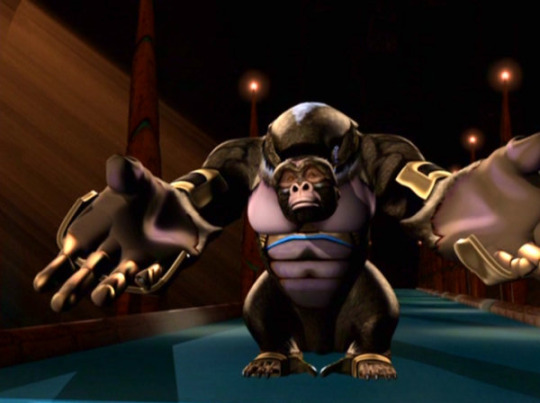
(Seriously, it’s not that deep.)
Fans need to stop confusing a character achieving a franchise long arc with being “suddenly different.” In this way, criticisms of canon in new entries in long running series reveal that fans really just lack imagination to connect the dots. It would be like complaining that Luke Skywalker can’t become paranoid and make a grave mistake in judgment because people never change, nevermind the character already has changed a lot from his origins in “A New Hope” to where he was in “Return of the Jedi.”

(Oh wait, people did do that…)
But that’s not to say you have to like the new direction either. You can understand these changes and still be like “well, it’s not for me. I don’t care for a PSTD angle or a new origin for Cybertron,” but that’s whole lot different than saying the new series “rapes your childhood” or “Bastardizes the canon.” All the old canon you hold nostalgia for still exists. My love for “Beast Machines” is not harmed by the existence of newer Transformers properties that don’t meet what I look for in the series.
Too often, fans take changes to established “lore” very personally because it doesn’t fit their expectations or have the same nostalgic feelings they had before. When new entries in mega franchises occur fans often try to judge it by how much it is like what they watched before, rather what makes it different and what it is saying now. Again, you don’t have to like new directions in tone or character but consistency to established work DOES NOT equal good storytelling.
I have not been immune to this myself in the past, of course. Back in the day I wrote a 2500-plus word diatribe on “The Amazing Spider-man 2” that mostly went after how it changed the character I grew up with in a bad way and butchered the established back story I knew him by.
You know what other story doesn’t follow canon very well though? “Spider-man: Homecoming.”
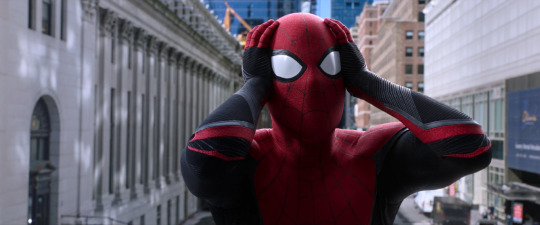
(Now, hear me out...)
Spider-man in the MCU is generally agreed upon to be a good thing by fans. Both movies were big hits both critically and financially and fans often go as far as to say Tom Holland is the “definitive” Peter Parker.
But Holland’s Spider-man differs quite a bit from the comic-book webslinger. This Spider-man does not have a spidey sense. His best friend is not Harry Osbourne but in fact a retcon of a Mile Morales character. His father figure is Tony Stark, something that never happened in the comics, instead of Uncle Ben, which no matter what way you spin it is arguably his most important relationship in the series.
His character is a reverse of traditional Peter Parker too. Where comics Peter is a reluctant hero, who if anything hates being Spider-man and the burden of his responsibility, “Homecoming” Spider-man actively seeks out responsibility and in many ways enjoys his role as the famous webslinger. In fact, his whole arc is about him earning a spot as an Avenger. He wants to be THE hero and be worthy of it. It’s completely different from what we know of Spider-man.

(He just wants Tony sempai to notice him uWu)
Now I know some fans actually do complain about this Spidey from a “canon” standpoint, but most don’t. So why did this Spider-man get a pass for many but not “The Amazing” one? Quite simply it’s because stories, as cheesy as it sounds, are about feelings and stories like “Homecoming” tell a good story that effectively make those feelings connect with the audience.
We root for this Peter Parker and his journey to becoming an Avenger and successor to Iron Man because the story is told well, the emotions feel earned, and frankly both films are fun and enjoyable.
It’s easy to complain about canon for many nerds because it’s something tangible that they can point to and make a big stink about when they don’t understand why a movie isn’t reaching them. I don’t doubt that many neckbeards genuinely hate a film like “The Last Jedi” (Hell, I’m not a big fan myself) but when those same nerds enjoy something like “The Mandalorian,” a series that has its own loose relationship with canon and establishing new rules in the series, it tells me it’s not about the “lore” to them.
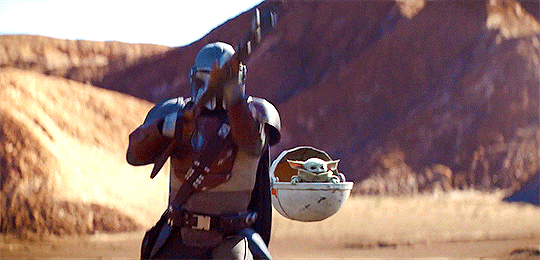
(Easy, fanboys...)
I have come to understand, in my growth as a nerd, that my problems with a lot of movies and TV shows in my favorite series rarely, if ever, have anything to do with the story not meeting some arbitrary guidelines regarding canon. It has more to with the story simply not connecting with me emotionally. The story isn’t drawing me in and keeping me on its narrative path. I’m not feeling the same magic that someone else might feel enjoying it because either a) it doesn’t feel earned to me or b) it just stylistically isn’t for me.
To paraphrase a line from another mega franchise, also owned by Disney, the canon is more like guidelines than actual rules.

(Didn’t expect to see ol’ Barbosa in this write up, did ye?)
It can show you where a story comes from but it isn’t law that you strictly adhere to it. Of course, when writing a new work in a popular series you should consider what came before it but I would like writer’s the freedom to try something new and most importantly fans to be open to it. You don’t have to like it but the idea that new entries in a story MUST remain strict to the canon is bull shit. Not even the original Star Wars trilogy adhered to its own canon perfectly, as clearly the writers were in fact making it up to a certain extent as they were going along.
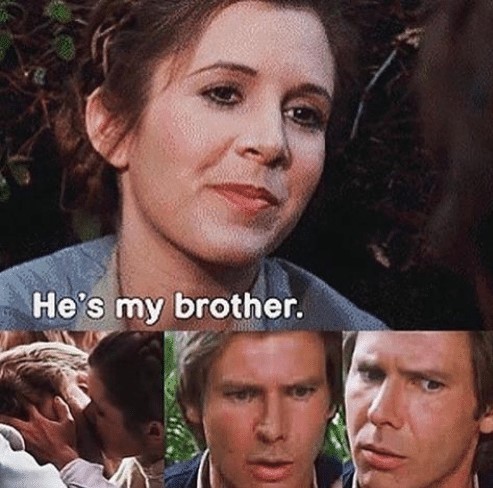
(hmmmm...)
And that’s ok, because some of those changes were great! Made the story better and made the conclusion stronger.
Again, you don’t have to like every new entry that tries something bold or confrontational in your favorite franchise but if writers strictly followed canon to the T we wouldn’t have things like “Homecoming,” we wouldn’t have “The Mandalorian,” and we certainly wouldn’t have my favorite Transformers series “Beast Machines.”
Canon shouldn’t be a trap for writers and it shouldn’t be a litmus test for fans digesting it. There are so many better ways to judge a story than whether or not it fits neatly into established lore. A good story is a good story, regardless of whether or not it’s supported by something as static as canon.
“Beast Machines” has its flaws here and there, but canon isn’t one of them, at least not for me. Again, if you feel that the lore is important, that’s fine, you don’t have to ignore it but I would ask you to look beyond what came before when critiquing a new story.
Otherwise, you might miss something special that comes next…
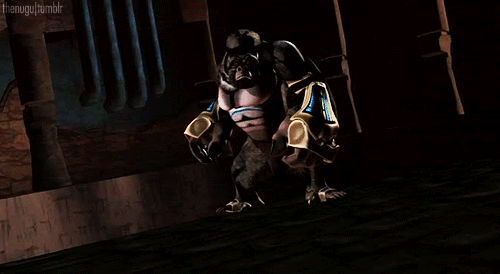
Now then...
#Beast wars#Beast machines#Optimus Prime#Optimus Primal#Transformers#Megatron#Star Wars#Star Trek#Lord of the Rings#Harry Potter#MCU#Marvel#Disney#The Last Jedi#rise of skywalker#Force awakens#Luke Skywalker#Kylo Ren#the mandalorian#The Matrix#The Matrix Reloaded#canon#lore#spider-man#spiderman#the amazing spider-man#spider-man homecoming#Peter Parker#Tom Holland#Andrew Garfield
23 notes
·
View notes
Text
Dispelling Myths: Model Minorities and Meritocracy as Sources of Harm and Hierarchy
by Neha Sampat
May 25, 2021

The Model Minority Myth lauds Asian-Americans as somehow superior to other minorities and parades them as proof of meritocracy and the American Dream: If you work hard, you will succeed. In doing so, the Myth creates a false racial hierarchy, placing Asian-Americans right below White-Americans and above all other racial minorities, thereby serving as a tool of oppression of all other minorities, and more broadly, as a manifestation of White supremacy that harms all minorities, including Asian-Americans. It is a form of the colonial “divide-and-conquer” strategy of oppression that pits one minority group against the other to sustain the power and privilege of the colonizers. It plays out in its harm societally and personally, but it also causes tangible harm in the workplace and to different minorities in different ways as they navigate their careers and their lives.
Right from recruitment, the Model Minority Myth is used as a tool of oppression and exclusion. Whether intentional or unconscious, many organizations and recruiters are relieved to find Asian-American applicants because doing so allows them to “check the diversity box” without having to confront their own anti-Black, anti-Latinx, and/or anti-Indigenous bias. In this way, Asian-Americans sometimes are recruited as “diversity candidates” and showcased as “diversity hires” by organizations that are not truly diverse. And the idea of checking the diversity box of course means that this type of hiring of Asian-Americans is a form of tokenism, whereby the Asian-Americans hired are not valued for their unique skillsets, experiences, and perspectives, but are valued merely for their identities as Asian-Americans and the optics they provide, which ends up stifling their authentic engagement in their work. Then of course, the employment data showing greater employment of Asian-Americans than other racial groups, perpetuates the Myth itself: “Well, see, these Asians have no problem finding a job; why can’t other minorities be more like them?”
The Model Minority Myth also plays out in a negative way for minorities once they are in their jobs, particularly when it comes to career advancement and monetary valuation. The Myth requires Asian-Americans to play by the rules and not step outside the lines: Be happy with what you’re given; don’t ask for more. We see the negatives impacts of this on Asian-Americans play out when it comes to raises, in that Asian-Americans are the least likely among racial groups to ask for raises, and when broken down by gender, Asian-American women, specifically, are the even less likely. In fact, one study found that white men are 1.8 times more likely to ask for a raise than Asian-American women!
In my experience as an Asian-American woman who has worked specifically with Asian-Americans in their career development, it is fairly clear that Asian-Americans (and even moreso, Asian-American women) are socialized to be agreeable and not rock the boat, which gives us approval as “model minorities.” I’ve experienced this myself: Asking for a raise always felt to me like rocking the boat. It felt risky and, based on how I’ve been excluded in the past due to my race, I rightfully feared that I would be the one to fall overboard.
The Model Minority Myth also negatively impacts all minorities when it comes to promotion. Bolstered by the stereotype that Asians are hard and good workers, an Asian-American may get that promotion over the equivalently or even more qualified Black-American. That is an example of how Asian-Americans are positioned as a “wedge” between White-Americans and other minority races. However, Asian-Americans still hit a leadership ceiling at some point, with Asian-American white-collar workers being the least likely among racial groups to be promoted into management positions, and with White professionals about two times as likely to get promotions into management than Asian-Americans. Asian-Americans are allowed (and in fact are expected) to be good, but they are not allowed to be the best. They are allowed to follow, but not allowed to lead.
I’ve seen this mentality play out firsthand, even in the diversity, equity, inclusion, and belonging (DEIB) field, with the role of leadership being reserved for White people and with Asian-Americans being looked to as great soldiers and followers. I can’t tell you how many times I have been approached by White colleagues and fellow business owners, asking me to join their teams and support their missions because they “need more diversity” on their teams. This is a double whammy because I’m being tokenized for optics reasons while also being expected to be a good soldier for them, the leader. Unfortunately, it has been a rarer occasion when I’ve been approached by White colleagues asking how they can support my ideas for equity and inclusion and support my mission; how they can follow my lead.
This dynamic is not just limited to Asian-Americans (although Asian-Americans may feel uniquely pressed by their role as “model minorities” to go along with it). After the murder of George Floyd and the reignition of the racial justice movement, I noticed a surge in White-led racial justice and inclusion initiatives, which would not be so awful if many of these initiatives were not already being implemented and led by our Black sibling experts in this space. Instead of throwing their weight, power, resources, and privilege behind the great work already being done by Black experts, some were entering the space to replicate what had already been done and receive credit for it. White supremacy teaches White people that they are the leaders by default, and this plays out even in the DEIB field, oftentimes with many subconsciously perpetuating it.
In my work focusing on internalized bias, I also see the Model Minority Myth being internalized to the detriment of Asian-Americans: The Model Minority Myth sets up an unbending expectation that Asian-Americans excel, and the buy-in to the Myth of Meritocracy sets Asian-Americans up to believe that when they don’t excel, it is because they somehow underperformed or didn’t work hard enough. So when Asian-Americans don’t excel, they may feel like epic failures. There is no space for Asian-Americans who falter and thereby disrupt the hierarchy, and that lack of space feeds the invisibility of Asian-Americans when they don’t meet the impossible pressures for performance or when they disrupt stereotypes about their group. There is a set space carved out for Asian-Americans in the racial hierarchy, and if they don’t do what it takes to get into and stay in that space (no matter whom they have to step on and how they have to alter themselves), they belong nowhere.
Sadly both myths (Model Minority and Meritocracy) feed Imposter Syndrome in the Asian-American community. Imposter Syndrome is the false narrative that one is not good enough for the work one is doing or wants to be doing, combined with a fear of being discovered as a fraud. Although Imposter Syndrome is commonly experienced by all races, it runs rampant in the Asian-American community uniquely as a result of the external pressure the Model Minority Myth puts on Asian-Americans to achieve, excel, check all the boxes, and abide by all the rules, setting Asian-Americans up to constantly feel like they are coming up short. This can sow the seeds of self-doubt in their minds, which then grow and flower into anxiety and a constant drive towards perfectionism, all of which can result in self-sabotage and underperformance (reinforcing the false narrative) and can fuel significant mental health issues.
Thus, the Model Minority Myth and the connected Myth of Meritocracy cause tangible harm to non-Asian minorities in America as well as to Asian-Americans themselves. Too many among my Asian-American community have bought into the myths and thus become pawns of our White supremacist system. They are unable or unwilling to see the falsity of the myths and the harm caused to other minorities, and clearly, unable to see the harm caused to the Asian-American community itself. The harm is fact, while “model minorities” and “meritocracy” are fiction. Only by facing the harsh truth can we dispel these myths and disengage from the system of White supremacy that oppresses all minorities, including the so-called “model” ones.
#model minority#aapihm#aapi heritage month#diversity#diversity and inclusion#bias#white supremacy#racism#belonging#inclusion#meritocracy#model minority myth#critical race theory#asian american#workplace#tokenism
3 notes
·
View notes
Text
Decalogue 2
This is a belated continuation of my Bering-and-Wells tenth-anniversary piece: a listing of “commandments,” one issued by each year of their association. I did the first five years in part 1. The ensuing years are of course both easier (I get to make up what happened!) and harder (oh lord, I have to make up what happened...). So this second five years’ worth of commandments—this second pentalogue?—will probably be both worse and better than the first. As always, I’m in it for the talking, but also for the idea that Myka and Helena would get things right, and wrong, and right again. I testify regularly that it’s hard work to sustain a long-term relationship. You have to want to do that work, and it isn’t always pleasant. But I’m absolutely certain that B&W would power through. Anyway I meant to do the ensuing five years as a single part, but I decided instead to fake myself into thinking I’m accomplishing things if I do them one or two at a time. I’m taking wins where I can find them right now.
Decalogue 2
Year six: Thou shalt not damage.
This commandment, which Myka would have been overjoyed to be able to keep in its absolute form, worked out in practice to something more like “You’re going to do some damage. Fix it as best you can.”
Distinguishing between where it was and was not safe to step was one of Myka’s most confounding challenges. So many years ago, at the start, the literal gunpointings had made the hazards very clear, but now, instead, Myka encountered metaphorical landmines, buried in places stranger than she had expected: she knew to step around guns and guilt; she knew not to mention Christina, unless Helena was in a mood to think about her. But how was Myka supposed to have anticipated that on any given day, a particular word would be a sensitive plate?
She had been complaining, expressing general resentment on the topic of her parents and Tracy and the grandchild. She concluded with, “And that’s my family for you.”
“They are your family,” Helena said, a flat statement that Myka could not parse. Then she stopped talking to Myka. Entirely.
Myka tried to ask, tried to find out what was the matter; then she tried just talking to Helena, pretending nothing was wrong, hoping it was some sort of circuit-breaker problem and that acting normal would throw the switch; then she offered a general apology for everything she might ever have done wrong; but in the end she had to give up. Helena with an idea in her head—whatever the idea was—couldn’t be reasoned with.
They slept in the same bed. No words. No contact either, but that was because Myka avoided it. She could deal, for a while, with being verbally ignored, but she didn’t think she could handle even one instance of Helena coldly refusing to escalate touch into intimacy.
Claudia couldn’t save them this time. Not that she didn’t try: “Talk to Myka!” she bellowed at Helena, but no talking ensued. “I guess you gotta keep trying,” she told Myka with a shrug. “Send her flowers?”
Well, flowers never hurt anything, did they? So Myka had an arrangement of peonies delivered to the B&B, because Helena had once been very “these belong in an English garden” about peonies, softer than Myka would ever have expected her to be.
Helena read the card—and Myka had to admit that the “I love you” message wasn’t very creatively written, even in terms of penmanship, but she was running on desperate fumes at that point—then very pointedly placed it and the peonies into the kitchen trash can.
So Myka’s best version of tenderness was in the garbage... clearly tenderness was not sufficient to fix anything. It was necessary, she was fairly sure, but not sufficient.
After much additional analytical thought, she developed a hypothesis. “I think I get it. Your family’s gone,” she offered to Helena, who barely twitched in response. But she did twitch, so maybe Myka had got it right? She continued, “And I’m being insufficiently grateful that mine isn’t.”
No response other than a very loud absence of anything resembling a twitch.
Back to the analytical drawing board... at which Myka now drew nothing but a blank.
It took an entire week for Helena to budge at all, but: prompted perhaps by Myka rescuing one of the peonies from the trash and putting it in a vase on the nightstand on Helena’s side of the bed, or maybe by Pete endlessly complaining “I hate when Mom and Mom fight,” or alternatively by Steve handing her cup after cup of tea and noting (just as endlessly) that it was “to soothe your laryngitis,” or possibly by the phase of the moon or a conspicuous mote of dust or something else that even Helena herself probably couldn’t or wouldn’t ever articulate, she interrupted Myka’s weeklong insomniac ceiling-staring session at two in the morning by pushing at her shoulder, hard, and saying, “I thought you might be moved to describe me as your family. But I see I have not been promoted to that exalted level.”
Helena was vocally doing “stoic” and “offhand,” insofar as anyone could really pull off either of those after a week of administering the silent treatment. Which meant that she wasn’t pulling them off at all, which in turn meant that Myka could hear the wound: a fault line sending a bleak rumble through the substrate of that voice in the dark.
“Exalted,” Myka said, herself trying to pull off “no, I never really thought you’d refuse to speak to me for the rest of our lives.” She was also trying to hide her embarrassment at being so analytically obtuse, as well as her shame at having inflicted pain in the first place. “Do you want me to not get along with you, too? Complain about you all the time?”
“You do complain about me all the time,” Helena pointed out, and Myka had to concede, at least internally, that that was probably more than a little bit true. She had to concede, too, that she had not in any way put Helena in her mental dictionary to illustrate the word “family.” The pictures of an endlessly troubling group of people from whom she could not really escape, about whom she complained all the time, had seemed to be a permanently closed set. Any additions, she had thought, would be similes: Pete was like a brother (and thank god that was once again true), Claudia like a sister (though a different sort than the one Myka actually had).
She should have known that Helena’s role in her life was literal, not figurative. And she should have known that Helena, in all her literal intensity, would have expected words to be applied.
Family. She complained about Helena all the time; Helena was endlessly troubling; and Myka certainly could not escape from her, as five-years-unto-six had shown. But the difference was that she didn’t want to escape Helena... apparently she’d mistaken that for a disqualifying factor, family-wise.
“You have sequestered me from those who are so exalted,” Helena said then. “Ideationally, but physically as well.”
“In my defense,” Myka began, but she faltered. “I know it isn’t much of one. But you haven’t been here for very long. I mean... you were, but then you weren’t. Physically. Since you brought that up. And we’ve been together for real for less than a year.”
Silence again, but this time it was an audible challenge.
“So I guess I’m taking you to Colorado Springs pretty soon to show you off.”
Myka realized, while she was searching for reasonably priced plane tickets for the trip, that this was the first time she’d hurt Helena in a way in which she might have been similarly likely to hurt anyone. She’d been so busy working on not making Helena-centric mistakes, those to do with guns and guilt and grief, that she hadn’t thought much at all about this relationship in a broader sense. It was singular, yes (obviously yes), but it was also two people in love with each other, trying to live with each other. Buying “meet the parents” plane tickets forced her to confront how pedestrian they were, as people in love with each other. It was both a minor disappointment and an enormous relief.
Arriving at her childhood home with Helena in tow was even more surreal than she’d imagined... despite the fact that she’d imagined it out, scenario after scenario.
It was also even more awkward than she’d imagined. “Mom, Dad,” she began, as her parents and Helena did nothing but look at each other, wary, as if a hostage exchange were about to occur, “I told you about Helena.” No one said anything. Yes, awkward. She had indeed told them, but that been... what it had been. Myka still wasn’t sure how to think about what it had been.
She’d called them, determined to tell it all—well, not all—but before she’d finished clearing her throat in preparation for launching into her prepared remarks, she was subjected to the usual enthusiastic recounting of grandchild activities. That was fine, though, for she did take a little schadenfreudic satisfaction in how quickly grandchild-centric material had replaced Tracy-centric information in these bulletins.
“I have a little news,” she said as the child-related hosannas began at last to run out of steam.
She took a breath. “I’minaseriousrelationship.”
One more breath. “WithsomeonefromworkhernameisHelena.”
After a pause, but not much of one, her father said, “How do you want us to respond?”
Myka had braced herself for questions, certainly, but not that one. “By being happy for me?” she offered, and she wished she had sounded decisive.
“Then we’re happy for you,” her mother said, and when had her mother ever sounded that decisive?
Myka could easily imagine them at the kitchen table, both leaning toward the phone that her father would have propped against the lazy Susan, for he’d always seemed to believe that placing a phone flat on its back rendered it helpless, like a turtle. That picture was very clear, very familiar. But she could not envision how those two people, addressing that upright phone, would look if they were happy for her. “Just like that?” she asked, because her inability to see it suggested that she shouldn’t believe it.
“If that’s what you want,” said her father.
Had he come up with that on his own? Had her mother kicked him under the table? Who were these people? Myka groped for words to address this strange moment in which she wanted to believe what her parents were saying. All she could come up with was a slow, “It... is.”
You were promised endless wonder, she reminded herself, and you do seem to be in the bonus lately. She’d heard Pete say “in the bonus” about something sports-related, and even though she hadn’t bothered to find out what the phrase really meant, it felt solidly descriptive of the way the past couple of years had been resolving.
Speaking of wonder, though, she did wonder, in the moment, whether what she had really wanted was to have to argue passionately for her reasons and right to be with Helena... to have to make that case. She probably wouldn’t have done it, not out loud to her parents; they were her parents, so she would have just resented them, adolescently, for not respecting her choices.
But now there was nothing big to resent. Was this adulthood?
Ignore it, she told herself, and she managed, mostly, to do what she was told. Her parents acted like she’d told the same thing to them; they didn’t bring up someonefromworkhernameisHelena when they spoke with Myka. Myka didn’t either.
But now here they all were, face to face in the doorway of her childhood home, her parents and Helena and her own instantly re-teenaged self, refracted by the bizarre temporal displacements that had worked together to stand them here, scaled strangely, like dolls from different playsets.
A few very formal words, such as “how do you do” and “pleased to meet you,” ensued, and Myka had genuinely never been so happy to see her sister when Tracy finally showed up. She did so sans grandchild, which Myka had requested; she tried to tell herself she’d asked for that because inflicting a child on Helena would be cruel, but in all honesty, she selfishly wanted her parents to focus not on that child, for once, but on Helena—no matter how contradictory it was of her to have tried for so long to avoid directing their attention to Helena at all.
“Myka talked about you like you weren’t even real,” Tracy greeted Helena.
“For some time I was not,” Helena greeted back.
As if Helena’s response had been the epitome of etiquette, Tracy nodded and said, “I’m going to pretend out loud that I understand that.”
Helena said, as a stage whisper to Myka, “I like your sister. She functions.”
“That may be the nicest thing anybody’s ever said about me,” said Tracy.
Myka said, “Helena can be very nice when she feels like it.”
Tracy made a face that reminded Myka she wasn’t the only one who reteenaged around their parents. “You probably can too, Myka, but I’ve never seen you feel like it.”
“I, on the other hand, have seen her feel like it,” Helena informed Tracy. “So you may have hope.”
Tracy said, as a stage whisper to Myka, “I like your girlfriend. She functions too.”
And Myka didn’t in the end care if it was Tracy’s imprimatur that made the difference: the fog of overpropriety lifted, leaving Myka free to sit back and witness Helena returning her father’s interrogative serves with H.G. Wells–related volleys—more of them than Myka had imagined could be worked into conversation. “Oh, I think my friend Edward Prendick expressed it best,” Helena began one anecdote, and she ended another, “...which brought home to me that we all feel invisible now and again.”
“You made a game of it,” Myka accused her later that night, when they had escaped to their hotel room.
Helena smiled an indulgent smile at her across the snowy-white acre of king-sized hotel bed that separated them. “Of course I did. How many points would you say I accrued?”
“I stopped keeping score,” Myka said, and she wasn’t sure if she herself was being indulgent or just grumpy.
“Quitter...” Helena began, a drag of amused accusation. But then she paused, got on hands and knees, and initiated a trek to Myka’s side of the bed. She could have done it catlike, teasing, but this was a common human crawl. “No, that’s wrong,” Helena said as she moved. She was taking her time, but it really was a very large bed. “You’re no quitter,” she announced, answering Myka’s unvoiced “huh?” with, “You feared that initial interaction.”
“That’s unfortunately true.”
“But you did in the end ensure that it occurred.”
“Because you wanted me to.”
“And here we are,” Helena said, reaching her destination. She leaned to kiss Myka, a slow melt in which Myka felt gratitude, and also softness, the sort that was always a surprise (see: peonies). Just as there were unexpected sensitive plates, there were surprisingly graceful bays of yield and give. This kiss was one of them. Gratitude, grace; and Myka felt too the future: this kiss was happening here, now, but this kind of kiss could (should) happen tomorrow, next week, years from now. Here, somewhere else, anywhere.
This is why we came here, Myka thought. Because we kiss like this. Someone you kissed like this was who you were supposed to bring home to meet your parents—and again Myka felt the sad slight press of disappointment at, but also the knee-buckling relief of, being exactly like everyone else. “Here we are,” Myka agreed. “In a hotel room in Colorado Springs. I have never in my life spent the night in a hotel room in this town.”
“Interesting.” Helena gave her a look that included a little aggressive chin-jut. “And how do you feel about that?”
“Don’t Abigail me,” Myka warned.
The chin retracted, minimally. “All right, I’ll rephrase: And what do you intend to do about that?”
But Myka felt not quite ready for what she intended to do about that. “Look, you aren’t them,” she said.
“Correct.”
“So you see my category error.”
“I do.” Helena said it soft, and Myka chose to hear it as an apology for, or at least an expression of some regret about, that wordless week. “You see my...” Helena stopped. She sighed. “My emotional error.”
A straightforward statement from Helena about having got something wrong.... Myka really was in the “endless wonder” bonus. “I do see,” Myka said. “We’re both pretty bad at this.”
“Also correct. How do you feel about that?”
Myka rolled her eyes, but other than that she didn’t bother.
Helena pursed her lips, which sometimes signaled frustration, but this time she coupled it with playful eyebrow movement. “What do you intend to do about that?”
They were bad at this so much of the time, but here they were in Colorado Springs, being better at it... good at it, even. “Ignore it for now and get back to kissing somebody. Something else that I have never done in a hotel room in this town.”
“I would think not, given that—”
“Listen, don’t make me explain what other kids did on prom night.”
Helena smiled a beautifully familiar smile. Lascivious, but only to the degree that Myka liked. So: respectful. Her tone was further along on the lascivious scale (and Myka was fine with that) as she said, “I don’t know what ‘prom night’ is, but perhaps you should explain. In detail. If I understand your implication correctly.” The word “implication” was accompanied by a placing of her body atop Myka’s that she also knew Myka liked. “Correctly” was accompanied by an application of pressure, one that she further knew Myka loved.
And that was how Myka came to enjoy what she would forever after remember as her very own personal—personalized—prom night.
During which she may have accidentally caused some bruising... but no damage.
Per the commandment. Which was difficult, but not impossible, to keep.
TBC
My non-tag essay on this one is very simple, and it is basically a version of the next “commandment,” which I had already formulated, but which the past few weeks have really made clear to me: “Thou shalt take nothing for granted.” In fact my original first ideated line of that seventh-commandment bit was going to be “Because if you take any given thing for granted, it will explode in your face. Guaranteed.” I am here to tell you that is true. Prize each and every minute of the life you consider “normal,” if that normal feels good to you. My wife was in a serious accident very recently. She’s going to be okay eventually, with luck and hard work, but change to your everyday, which you may undervalue as I did mine, comes as a whip-crack.
#bering and wells#Warehouse 13#fanfic#Decalogue#part 2#(although it deals with the sixth commandment)#(apologies for how weird the numbering of all of this will end up looking)
39 notes
·
View notes
Photo
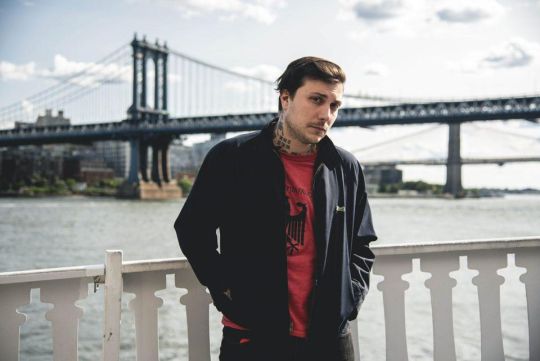
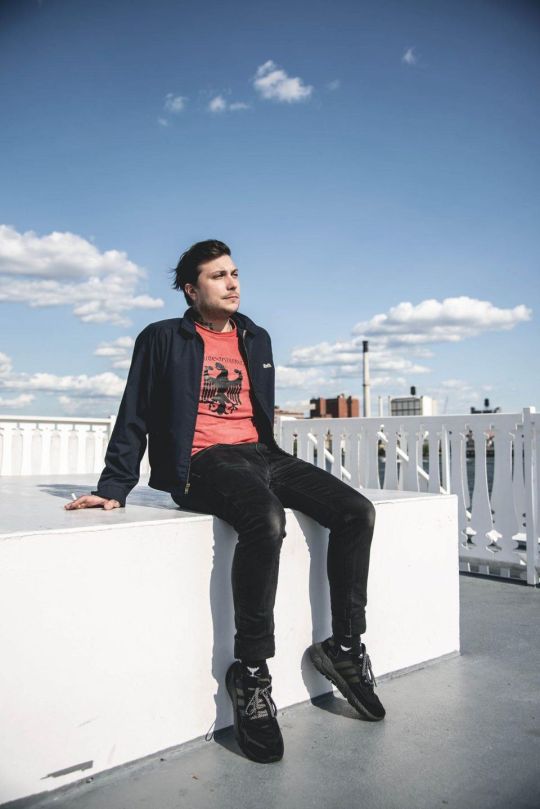
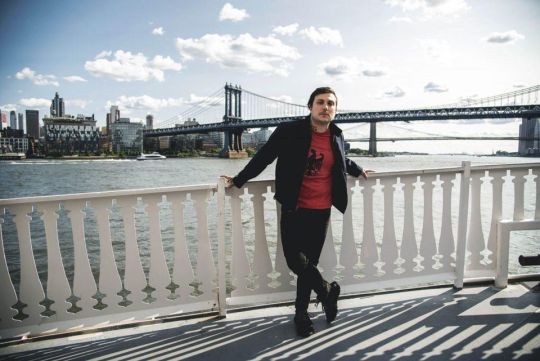
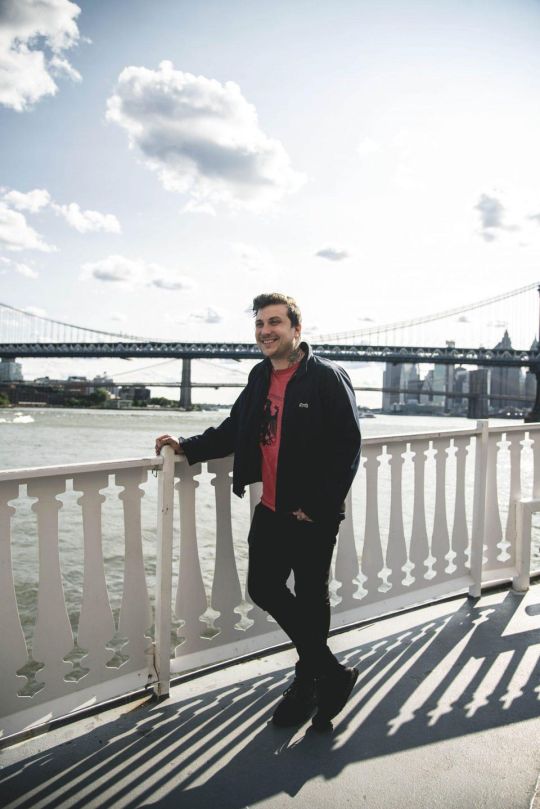
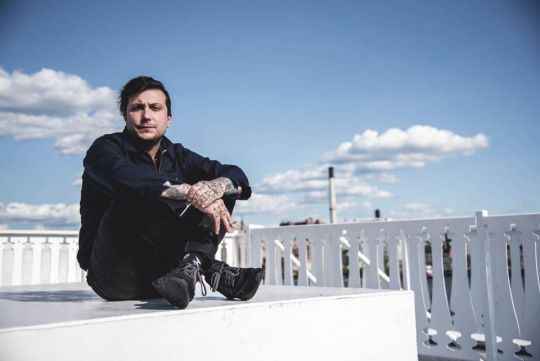
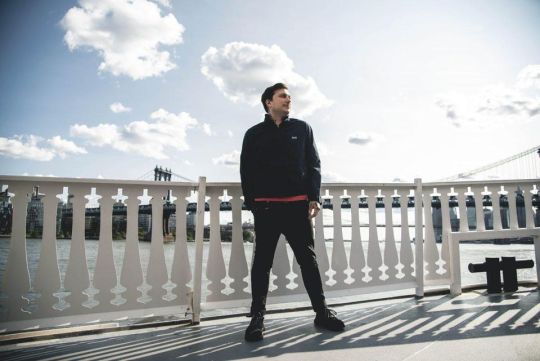
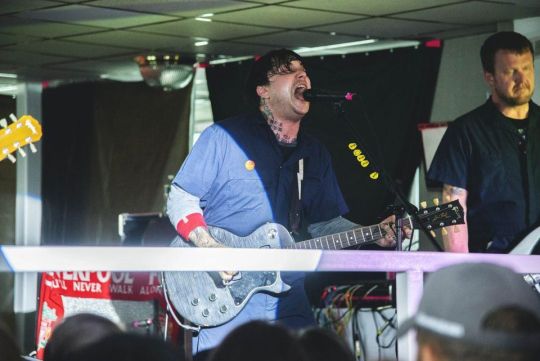
Frank Iero, New York, NY, June 2019 (X)
Aug 29, 2019, 09:10am
Frank Iero May Just Be His Own Puppet Master
Photo Credit: Audrey Lew
Interview below the cut
Derek Scancarelli
Contributor
Hollywood & Entertainment
I am a music journalist living in New York City.
Frank Iero is breathing deeply and fighting off nausea. This isn’t uncommon for the 37-year-old guitarist and vocalist, given his predilection for debilitating anxiety. But on this occasion, it isn’t pre-show jitters.
“Oh my god, I hate this f*cking boat,” Iero says, as the docked vessel on which he sits knocks against a pier in the Lower East Side of Manhattan. Iero and his band, The Future Violents, just finished an intimate Saturday matinee show as fans sweat, sang and caught a glimpse of the Statue of Liberty.
It had been about 16 years since Iero and his now defunct band, My Chemical Romance (the band broke up in 2013), first performed on water. In July of 2002, the band released its debut album, I Brought You My Bullets, You Brought Me Your Love. In October of 2003, the soon-to-be emo heroes performed alongside New York Hardcore legends Sick Of It All at an aquatic gig booked by New Jersey college radio station WSOU. And in June of 2004, My Chemical Romance released Three Cheers for Sweet Revenge, the band’s platinum-selling breakthrough record. In a matter of two years, Iero’s life changed dramatically.
In 2019, Iero still hasn’t found his sea legs, but a lot more has changed. He’s fathered three children, released three full-length solo records (including 2019’s Barriers), and survived a near-death experience. And as he gets older, he finds truth in life’s greatest clichés.
“Time flies, it just screams by,” Iero says. “You think you’re appreciating the time, but it’s easy to take it for granted. It’s a shame.”
But Iero is trying his hardest to pay attention to the little things, especially when it comes to family. He and his wife, Jamia, have three children together: nine-year-old twin daughters, Cherry and Lily, and a seven-year-old son named Miles.
“It’s wonderful to see them evolve and come into their own,” Iero says. “But it’s funny how personalities are innate. We shape the way they experience things or teach them the ropes, but for the most part, I’ve found that we are who we are when we’re born.”
From the start, Iero has seen an even split in the twins’ personalities. Cherry, he says, most behaves like her mother, whereas Lily possesses her father’s attitude.
“Some of the sh*t I hear coming out of my daughter's mouth,” Iero says laughing. “My God! It’s stuff I think but never say — they don't know to be ashamed yet! It's amazing and honest and pure. And I know exactly where she's coming from because I feel the same way.”
As part of fostering a relationship of trust and honesty, Iero has been age-appropriately transparent with his kids about the 2016 accident that almost killed him, his brother-in-law and guitarist Evan Nestor and his manager Paul Clegg.
While unloading gear from their van in Sydney, Australia, a city bus crashed into the group and their vehicle. In a 2017 interview with MTV, Iero recounted, in vivid detail, the moment he was dragged underneath the bumper of the bus, the screams of his brother-in-law, and the blood pooling from his manager.
Although Iero was able to walk into an ambulance carrying one of his friends, the scene was a spectacle overrun with emergency personnel — they even landed a rescue helicopter in nearby Hyde Park. Despite serious injuries, amazingly, there were no fatalities.
When Iero returned home from the hospital, he explained to his children that he was in a car accident, but that it was a singular freak incident.
“You don't want to lie,” he says. “They're getting older. Their friends and their parents are on the internet. They're asking questions. It does get back to them.”
Iero was as honest as possible, but avoided any gory details. He was also conscious that it wouldn’t be long before he would travel for work again — and he didn’t want to scare his kids any further.
Almost four years later, residual damage from the crash is impossible to ignore. Nestor has nerve damage in his leg that may never be corrected. Clegg’s leg and knee have undergone multiple surgeries, but are in poor shape. And Iero still has a tear in his shoulder that hurts every time he plays the guitar. Despite the pain, he’s afraid to undergo surgery.
“I was lucky enough to walk away and still play,” Iero says. “If I were to test fate again and go under the knife, if something were to go wrong… to let that be taken from me … no, I can't.”
On some days, the emotional toll of surviving such a traumatic accident weighs more heavily. Iero describes his recovery as non-linear: some days he feels collected and in control, other days the memory rushes back into his mind.
After his new band finished recording Barriers, Iero and his team went back to Australia for appointments pertaining to the accident and corresponding litigation. As soon as he exited the plane, Iero felt like he’d returned to the horrific scene. For the following week, he was barraged by an unending state of panic.
“You go through these instances of PTSD,” he says. “You never know what's going to trigger and send you all the way back to the beginning with recovery.”
Iero greatly underestimated how difficult his return to Australia would be. When navigating to a doctor’s office near where the accident occurred, he couldn’t bring himself to walk down the street. And suddenly, he felt surrounded by buses.
“I don't know if this is true,” he says. “But it felt like every other car on the street was one of these f*cking buses. They were everywhere. It was frightening. I couldn't do anything. I was shaking like a leaf.”
Despite the traumatic flashbacks, Iero continues to reflect on that day. In the promotional run for Barriers, he discussed the accident at length. And on the record itself, he addresses the complicated ripple effect it’s had on his entire sense of self.
“I don't think it needs to define me,” Iero says. “But it was something I needed to talk about on this record. It's not something I could sweep under the rug. But do I want to dwell on it every day and relive it? No. But I think about it constantly. I feel the pain constantly. It's on my mind.”
In recent interviews, Iero has tended to frame a few philosophical takeaways from his ordeal. In simple terms, the first idea is that he’s found a new lease on life — that everything happens for a reason and he’s been given an opportunity to seize the day. The second philosophy is much darker, a sort of survivor’s guilt compounded with fear and existential dread. The third and most abstract consideration is closest to Simulation Theory — where Iero has the ability to control his own artificial timeline.
Sometimes, Iero questions if actually died that day. He wonders: Is this all real?
“It’s hard. No one can tell you what to believe,” he says. “But you come to this realization, ���Well, this is real to me, the hand I was dealt, so I have to make the best of it!’”
Through the acceptance of uncertainty, Iero surmises that he just may be his own puppet master.
“If this is a figment of my imagination,” Iero says. “If this is all in my head, then I am the master of my own destiny. If I want to do something, I can manufacture it. And if it's not the case, then at least it's a self-fulfilling prophecy. Maybe putting positive vibes out into the universe is beneficial. If we didn't make it and we're just going through this weird labyrinth in my mind, I can do anything I want.”
And lately, he’s been doing just that. Call it sorcery or the power of positive thinking, but Iero is motivated. For Barriers, he was able to assemble a dream band, The Future Violents (different lineups of his backing band have previously gone by The Cellabration and The Patience), featuring his brother-in-law Nestor on guitar, Thursday’s Tucker Rule on drums, Murder by Death’s Matt Armstrong on bass, and Kayleigh Goldsworthy on keyboard.
The theme of the album — and his own internal dialogue — mostly relates to tragedy and timing. Did the universe have a course set out for him? Or was he just some random victim?
“The crazy thing is that you didn't do anything wrong,” Iero says of the accident. “Yet, all of this stuff was taken from you and you have to make these decisions. You get angry a lot.”
He continues: “These random, abrupt, violent actions. Do they happen to us? Or for us? I wouldn't have been able to make this record if it didn't happen. And it made me realize a lot of things about myself. Am I happy it happened? No. But I'm happy where I am right now.”
Iero views Barriers as an exercise in vulnerability. If the aftermath of his accident taught him anything, it’s that success was meaningless to his character, but adversity helped him grow. For the first time, addressing childhood trauma helped Iero expose himself in a way that felt freeing.
“When you put something to song, it gives that memory weight,” Iero explains. “If you never talk about it, it's almost like it didn't happen. There's a fine line between relinquishing that power to this memory, situation or trauma, or holding that power over it and creating your own narrative from it.”
Barriers also intertwines Iero’s childhood experiences with his current perspective as a father. This go around, he felt comfortable writing about his parents’ divorce — the couple split when he was three and divorced when he was seven.
He looks back on the unpleasantness of the process and his consequential understanding of his mother’s issues with addiction, depression and mental illness. On his 2016 record, Parachutes, Iero first referenced his mother’s struggles and his own liability to inherit her traits. He’s still horrified by the idea of predeterminism.
“When you're a young kid being surrounded with it, it doesn't feel right,” Iero says. “You're not happy. You're scared. You're constantly concerned for your parent. It’s almost as if you become the caregiver.”
He continues: “Then you see yourself falling into these patterns that you were witness to and maybe in a roundabout way were taught. That addiction, that depression, runs through you. It's easy to fall off that cliff. I don't want that for my kids and I need to stop this cycle. Like this sh*t stops with me. Whether it be I get okay, or I f*cking turn my lights out.”
It’s this sort of tongue-in-cheek use of concerning language that keeps Iero’s fanbase enthralled, yet somewhat on edge. Take for example, in the comment section for his video “Young & Doomed,” some diehard fans are troubled by his repeated use of the words “hurt myself again.” While he’s surprised to hear about the response, he counters that the record is ultimately meant to feel uplifting and positive, even if addressing dark topics.
“I don't think that we should strive for perfection,” Iero says. “This idea that we should all have this perfect life and be pretty and purse our lips to post a picture on social media is bullsh*t. The things that make us unique are important.”
He continues: “Sometimes we're our own worst enemies and we hurt ourselves. Those scars, though, are important. They're beautiful. ‘Young And Doomed’ is a call to arms to celebrate the things people think are wrong with us.”
Now, Iero just hopes his story and music inspire fans to try, fail and try again.
“You don't find out who you are unless you get a scar and get hurt,” Iero says. “You should be hurt, hurt other people, and learn that it feels terrible to hurt someone else. You should feel sorry for it and make amends for it. These are important lessons to be a better person. You find out who you truly are by attacking things that scare you the most.”
Frank Iero is currently touring Europe with Laura Jane Grace & The Devouring Mothers.
#frank iero#august 2019#forbes#audrey lew#red eagle shirt#all blue#october 2019#bus crash#navy blue tiger windbreaker
470 notes
·
View notes
Text
Dobson’s favorite cartoon reviewed: The adventures of spandex girl in New York aka the Miraculous Ladybug movie
So THIS is not going to be about a Dobson comic, but rather with the lack of Dobson posting shit out here, I thought I give my opinion about something Dobson would have likely sperged out within the last few months. What could it be I want to talk about? The riots? The death of RBG? Cuties?
Are you insane? My brain may function better than Dobson’s, but even so I am not touching those subjects with a tong, seeing how I myself am lacking detailed knowledge on such subjects. No. I am talking about the cartoon that makes Dobson’s little brain (and dick) all tingly: Miraculous Ladybug.
For starters, let me just say that despite being an animation fan myself, I am not really into this show at all. For a magical girl show that goes on for over three seasons at this point, I just feel like nothing happens in it. Sure, A LOT of tokusatsu and magical girl shows run on repetitive monster of the week formulas, but overall they will still have some progression to themselves. Growing up with Sailor Moon, I always loved the first season and how it actually made me feel like things are increasingly at stake as the story progressed. Especially in the final episodes when the Senshis actually died protecting Sailor Moon and it was only thanks to a Deus ex machina everyone was reincarnated again. As melodramatic as Sailor Moon could be, at least each story arc had a beginning and ending that did not overstay its welcome. Ladybug meanwhile can be summed up as followed:
Teenage girl is thirsty for obvious blond boy whose dad wants to get magic jewelry to necromance his comatose wife. Teenage girl gets magic jewelry and turns into heroine in ladybug mustered spandex suit that makes rule34 artists all tingly. Same goes for boy she has the hots for, only he becomes gimp catsuit shota bait. Bad guy transforms random citizens who feel down for some reason (often times connected to a blond whose family name Dobson can’t write) into action figure like super villains. Ladybug and Cat Noir defeat them, the damage is reseted, Ladybug and Cat Noir never figure out who the other one is despite things being so obvious Ray Charles could have seen that shit coming. Repeat not just for one, but ALL seasons so far and add as little as possible storywise to increase the roaster of characters, but not progress the plot.
All that said, I can say that there are worse shows out there and for a show meant to sell toys to girls and be about a female hero, it is not THAT bad. But a) the creator is an asshole (think of functional Dobson) and b) there are still better shows to watch, even within the preteen magical girl genre, than this. Not to forget that this thing may be the indirect successor of Totally Spies and give certain people internet related fetishes within the next few years.
So, why am I believing Dobson would talk about the show at least for today more than he already tends to do on average? Because Ladybug actually got now a movie.
Well, it is called a movie, but in reality it is more of a 3 parter to start the fourth season if you really look into it. The thing is called Miraculous World: New York – United HeroeZ. It clocks in around 65 minutes and focuses on Marinette and Adrien in New York, teaming up with new heroes that are so unsubtlety promoted in this movie, I expect them to get their own spin off series by the end of next year so the showmakers can milk the cow even drier.
Let me try to elaborate in what is going to be a less than just a bit snarky summary with a few critical points and jokes at Dobson’s expense thrown in here. In other words, the typical biased youtube reaction channel/movie review. Spoiler warnings are obvious and I promise than unlike certain pedos on youtube I am not going to focus on the assets of underaged French girls. I do warn however for increased levels of making a fool of myself by writing a multi page “mock summary” of this thing.
So because the movie is based on a children show, it has a very basic set up; Adrien and Marinette’s class is invited to spend one week in New York, because of a pointless international collaboration thing referred to as French-American Friendship week. The sheer existence of this showing that a) we needed any reason to get them there and b) this special was worked on LONG before COVID19 hit us all. And yes, I know animation takes its time to be done, I just think it is funny how in today’s international political climate and health situation this thing has become outdated already, when it is hitting the tv just now.
At the same time, Adrien’s dad suspects that an artifact currently shown at a museum in New York may be a missing Miraculous that was owned by the Marquis de La Fayette and gifted to George Washington during the American Revolution. And yes, we are going there and you can guess what Hawkmoth’s goal this time is, while at the same time history gets fucked up the butt.
But before we can get to any action in New York, we have to deal with the one thing Ladybug is known for best: Cringy shipping bait.
Look, I know that shipping is a part of magical girl shows in general, but the shit going on in this cartoon is not only drawn out tediously even for children tv standards, I find it makes some characters outright dumb and unlikable. We get it Marinette, Adrien makes you tingle. But can you stop cringing your way through life around him in a manner that would make Tomoko Kuroki say that you are freaking pathetic?

I don’t want anybody else. when I think about Adrien I...
Just three minutes into this movie she essentially melts away at a poster of Adrien and throughout the first 15 minutes she just simps away in the big blue yonder. For example by asking Adrien’s dad to allow his son to travel with the others to New York, obviously stumbling upon her words when she needs to remind herself that she can only see Adrien now as a friend and not love interest (because this is supposedly set after season 3, when she decided to go for the second price in form of the guy who plays guitar), insisting that she is only “friends” to the point even her best friend Alya gets fed up. Or when Marinette gets more than just “a bit” nervous at the chance of sitting on her flight to New York next to Adrien, resulting in her fucking that chance up so badly, I felt an headache approaching.
Not gonna lie, I had to pause a few times because it got so cringy for me, I wondered why Dobson makes primarily jokes on Adrien’s expense when Marinette herself is female thirst personified. Even the movie seems to point out how the two are so obvious to each other, when Alya has the following to say about them: I can’t decide if they are the most cutest people I know, or the most embarrassing.
Thankfully it is at 18 minutes into it, we FINALLY get something of a conflict. While still on the plane (And Adrien and Marinette watching a sunset through a window) a villain shows up, trying to steal the jet engine midflight.

Just roll with it
Thankfully, before the plane can go down thanks to a Gremlin on the wing- I mean TECHNO PIRATE, the real stars of the movie show up.
Wait, you thought this thing was going to be about Ladybug and Cat Noir being the primary heroes? WRONG!
Okay, to put the summary on hold and explain what I mean: This “movie” introduces us to “United HeroeZ”, a group of American superheroes. Yeah, turns out Miraculous is essentially set in your average “Superheroes are everywhere, but primarily US dominated territory” world and this story is meant to introduce us to them and have Ladybug and Cat Noir team up in order to save the day. And while I don’t necessarily HATE the characters, I have to admit that I can’t help myself but snark quite a bit about them. Not only are they for the most part just expies of well known superheroes, the way how prominent two of them in particular are featured in this movie makes it very, VERY obvious that (As I stated earlier) this thing aims just to create a tie-in show for the creators to make more money of the property. Not just that, but their presence in a way reduces Adrien and Marinette’s importance as characters, even though the new ones at best would count as supportive characters overall. Which again makes me wonder, what does it say about Ladybug and Cat Noir’s “impact” in their own franchise when I actually find myself more interested in the side characters made to promote new toys, than the actual leads?
Anyway, United HeroeZ defeats Techno Pirate and in doing so we are introduced to the main members of the group which are relevant for this movie:
So please, give an applause for…. MAJESTIA (aka actually decent Powergirl redesign/Non Superman)
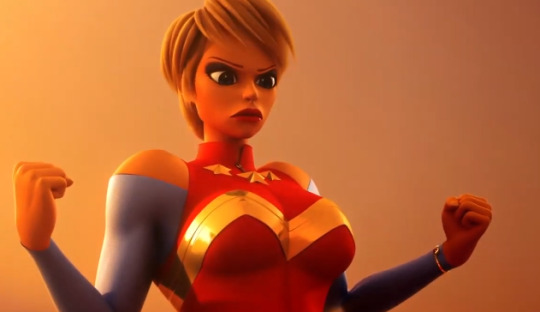
SPARROW (Aka yet another Robin that may get hit by a crowbar)
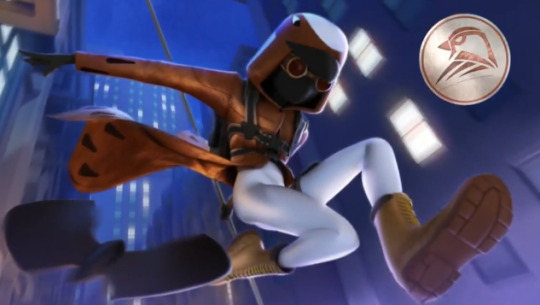
UNCANNEY VALLEY (aka The Shipper on Deck/Cleopatra in Tin Foil/Vision as your Waifu/the dumbest name you could have chosen for a character!)
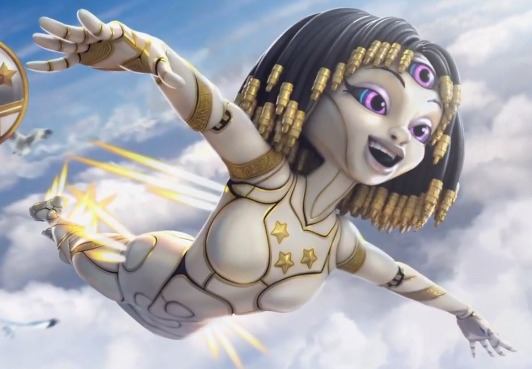
NIGHT OWL (aka Alan Moore is going to be pissed!/Oh look, it’s Batman!)

You get where I am coming from when I call them expies, right?
Anyway, with the plane safe the class finally gets to New York. Both Sparrow and Uncanney Valley get tasked to go undercover with the students and assure they are save during the trip, because plot reasons and New York is supposedly enough of a safe place that their services aren’t needed to fight bigger threats currently. Which confirms at the very least that a) this is not the Marvel Universe cause at this point the town may be ground zero yet again and b) a way more enjoyable version of the Big Apple than the real deal.
By the way, these are Uncanney (left) and Sparrow’s (right) civilian identities :
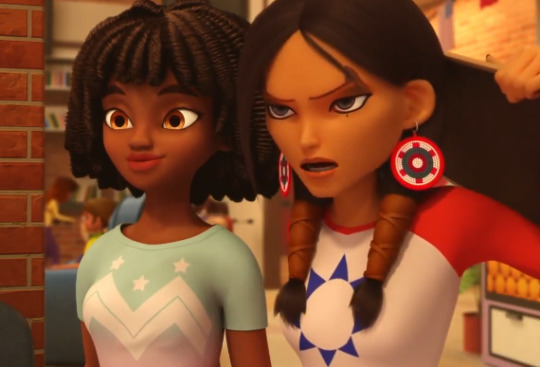
I can now imagine Dobson wanting to proclaim how problematic the character is for being a native American who looks the way she does. But believe me. It gets kinda worse in all the right ways.
Also, we are 28 minutes into the movie and we are introduced to the dumbest thing in the movie yet. The arch enemy of the Condiment King; Hot Dog Dan.
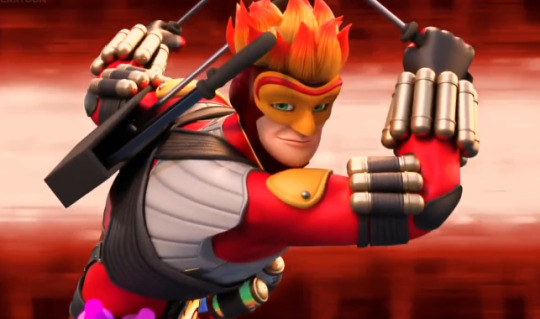
A superhero hot dog vendor seller with a flying hot dog truck, whose hot dogs give you temporarily some random superpowers when you eat them. And it seems he uses hot dog tongs as weapons.
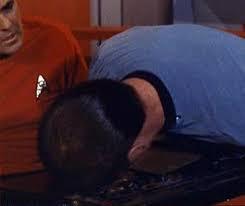
I don’t know what the people making this show take, but I am torn between wanting some of that myself and putting them into rehab.
I really bring the character just up because he is as a concept in itself so ridiculous that part of me thinks he is a fever dream of Dobson. Otherwise he has no real bearing on what is going to happen on the rest of the movie. He is just relevant for a three minute long scene of a house roof party during which Adrien and Marinette dance for a bit.
Speaking of relevance, the next day the class finally gets to do something on the trip that leads into conflict for our heroes to face. During a visit of the museum where the La Fayette related Miraculous is hold, Uncanny and Sparrow decide to play shipper on deck by forcing Marinette and Adrien in a room and attempting to set a really stupid plot into motion (and no, I don’t mean they enforce a reenactment of Steven Universe or something). At the same time the villains finally do something, when Hawkmoth (now in New York) turns Techno Pirate into his latest minion and have him attack the museum to steal a saber by La Fayette as distraction, while he takes the charm he is out for. Long story short: Our heroes FINALLY transform and have to fight with Uncanney and Sparrow against Techno Pirate on the roofs of Manhattan.
And while I don’t think it is all that great of a fight, it still means something aside of Marinette cringing her way through the plot is happening and the heroes are actually in decent peril. Plus during the fight the movie gives me one of the funniest moments possible. You want to know what it is?
Well, while fighting the bad guy, Cat Noir and Ladybug obviously trigger their miraculouses. And what does Ladybugs miraculous turn into this time, to help her develop a strategy to defeat the villain and save the day?

A bikepump.
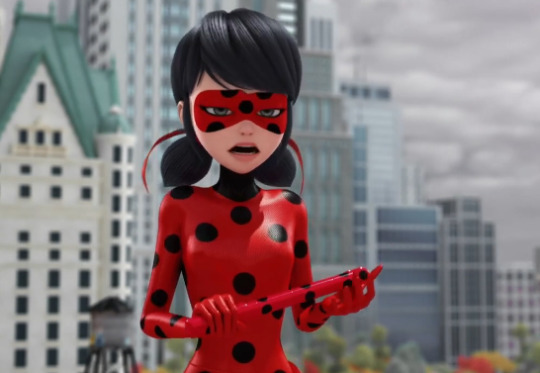
... yeah, I am going to give all of you now 5 minutes to laugh it off. Believe me, I needed them too.
Sure, it is a cartoon and I doubt anyone working on the show is even aware of our favorite uncare bear, but come on. At this point the universe itself is either mocking Dobson or tries to set up the perfect opportunity for an obvious joke from my side.
Not helped by the fact that once the bike pump shows up, the dialogue between characters that follows is, and I quote:
Cat: A bicycle pump? What are you going to do with that?
Ladybug: I may have an idea, but you wouldn’t like it
Anyway, believe it or not, the fight actually ends with a surprising shock moment. Cat Noir, while having his cataclysm powers active (you know, the powers that make him decompose anything he touches), being thrown by Techno Pirate at Ladybug, resulting in Uncanney protecting her and being turned into scrap metal. Which in turn causes Techno Pirate to make the acquaintance with Majestia’s fist, as Uncanney is more or less her adopted daughter and I guess she has seen what was going on (but did not interfere because the plot says so) until now, pummeling him so hard he flies through a few buildings and causes at least three 9/11 to happen on this day in New York.
So, yeah. Uncanney is dead. The heroes experiencing their darkest hour in the movie.
… welp, can’t have that for long, so less than 2 minutes later Ladybug uses the Magical bikepump…
5 minutes of laughter later
Got it out of the system? Good. As I was saying; She uses the fetish toy to reset all the damage done by the akumatized villain and in doing so fixes Uncanney too.
Welp, that was a waste of tension. Guess someone watched the entire Lars dying thing from Steven Universe.
So, damage undone, but Majestia and Night Owl pretty pissed at what happened, want Ladybug and Cat Noir to give up their miraculouses (I assume that is the correct plural) until they leave New York. You would expect this to result in some dramatic chase scene or confrontation with the older heroes, but because this movie has just like 22 minutes left and we need to close act two now, our heroes instead flee and end up in the sewers of New York.
There they do NOT team up with a group of mutated reptiles, but have a heart to heart talk (I never thought I would agree with Dobson on something, but I have to agree on this: The show is kinda fixated on having important stuff happening in sewer channels) that is sort of an argument Cat Noir and Ladybug also had during the fight. You see, because those two idiots haven’t figured out their respective civilian identities yet (something even Sailor Moon would have figured out AFTER THREE SEASONS!) Marinette assumed that Cat Noir would be in Paris while she is in New York to keep the city save. And Adrien/Noir was okay with making the promise of keeping the city initially save, because his dad only allowed him on the trip the day after he made the promise. So when the two transform out of sight of the other in New York and meet, instead of asking some logical questions (like “where is Marinette/Adrien and why is Cat/Ladybug here?”) they kinda argue wtf Cat is doing here while Paris may be in danger.
Long story short, she is angry at him, he feels guilty for having disappointed her and the thing with turning Uncanney into scrap, Paris was attacked by Hawkmoth’s secretary unleashing temporarily some monster clone because Hawkmoth thought that distracts the heroes in Paris (and really just results in damage that makes a city that experienced the destruction of Notre Dame the year prior just feel numb) and because this is the turning point in the plot, our hero needs to do something just a bit too melodramatic. Which is that Adrien gives up his powers and runs away.
… so, up to the final part in which things to care about start to happen.
Hawkmoth now has the Miraculous and unleashes its Kwami who is this eagle themed little thing referring to itself as the “Kwami of Freedom”.
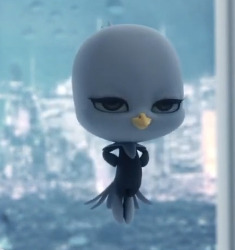
… Yeah, this thing was NOT around for the last 200 years, wasn’t it?
Anyway, it states that its powers are based on “freeing” people of limitations to achieve their full potential. What does that mean practically? It means that when Techno Pirate holds its powers on top of his regular powers increased by being akumatized, he can unleash some energy attack that removes moral inhibitions when getting hit by it.
… So it basically unleashes the Purge.
Which is exactly what happens to Majestia and Night Owl, turning one into Man of Steel Superman causing nine additional 9/11s on top of the three prior (how the fuck did this movie manage to turn an American tragedy in a measuring unit?) and the other into All Star Batman.
Oh and it turns the President of the USA into a worse war monger than people accuse Trump of being.
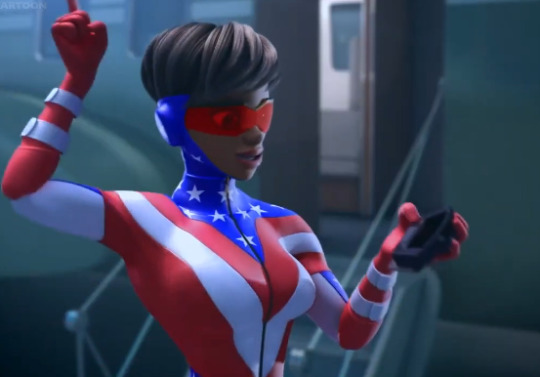
Oh, this is NOT going to sit well with anyone...
… Yeah, sidenote: The president of the USA in this movie is essentially Michelle Obama who ALSO is a superhero with an American flag theme and besties with Majestica and Night Owl, trying to protect the exchange students. Because supposedly NOTHING better needs to be done. Once she gets hit by the “Freedom Feathers” or whatever you want to call the Kwami power, she pulls out the Football and activates turrets all over the USA, ready to blow up anything that moves into smithereens. Including at least 10.000 such turrets on the roofs of New York and a nuclear missile in the bay near the Statue of Liberty.
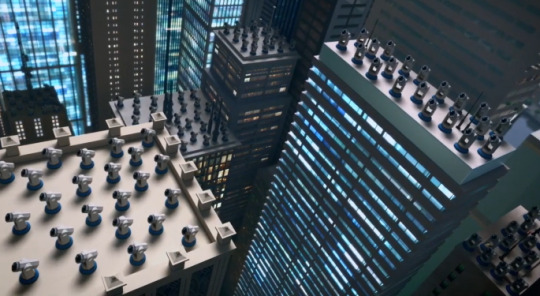

I’ll take it to the people with the eagle not the dove. If there is one thing that obedience is symptomatic of, it’s W-E-A-P-O-N-R-Y... WEAPONRY, from above!
(BTW, the rocket is animated like shit!)
I get the feeling someone on the production team is not the biggest fan of America.
Anyway, with the heroes being useless and Marinette and Adrien mopping around for what happened during the battle (and Adrien being tricked by his dad to leave New York and get back on a plane cause this town is not save and Adrien can’t fucking stand up to his emotionally abusive father), Uncanney and Sparrow have to get the ball rolling so the day can be saved. Which means that Sparrow and Ladybug try to fight and distract people for time (off screen mostly), while Uncanney hijacks Adrien’s plane and brings him back to take up the gimp suit of Cat Noir again. Oh yeah, almost forgot, Uncanney, cause she is a robot, has figured out easily who Ladybug and Adrien really are cause scanning. Making our heroes literally dumber than a walking toaster.
So the four finally together, fight Techno Pirate on the Statue of Liberty a second time (after some hijinx with another corrupted hero whose power is literally to create portals through doors, but he is irrelevant for anything so I skipped him up until now) and defeat him. He loses the Miraculous, Sparrow takes it on and becomes its next official owner, resulting in her costume turning into THIS

So now we have the native American girl turn into an eagle based superhero with a costume that looks like out of a western based Lego set.
Real talk here: Unlike Dobson I do not believe that everything is political or offensive or some other shit. In fact I hate his comic where he talks about “skin color changes” of the black characters in Ladybug, because he essentially tries to create a race issue and tension where there is none, just because he is a social justice moron. Which gets especially funny when his ideas for a progressive female results in characters like the black rat pirat who kicks you in the face for being hetero or infantilizing the characters of Patty to make them visually more appealing to Max Karson.
That said, in this day and age, doing a character like that… kinda yaiks.
Like, on one hand I think the girl has an enjoyable personality and the design of her hero outfit is okay for a kids cartoon. It’s not like she also talks in some cartoonishly native way or has suddenly a tomahawk as a weapon.
On the other hand, it is kinda stereotypical from multiple ankles and unfortunately there is nothing to the character past this point. Oh sure, Sparrow has now Miraculous powers, but really, all she does now is just use her powers to nullify Techno Pirates influence on the adult heroes before Majestia manages to reenact the bad ending for Majora’s mask and that is it.
Granted, there is Hawkmoth also almost starting World War 3, but that is really just happening at the site and dealt with almost instantly. To be more specific, because Ladybug and Cat Noir did not hand over their Miraculous, he lets Techno Pirate launch one of the missiles near the Statue of Liberty (worse president than Trump, honestly) but before the thing can hit anything, Majestia sweeps it away and throws it into the sun.
You know, if the show writers want to make Adrien’s dad even remotely “sympathetic” or interesting/intelligent, they increasingly fail. Cause I don’t know about you, but causing World War 3 does not really feel like it will benefit in bringing your comatose wife back.
Bottom line: Nuke has been burned, Techno Pirate gets defeated, all the damage reseted, Sparrow is now the official owner of the latest Miraculous and renames herself Eagle, everyone is happy, there is a big celebration for the class and Hawkmoth is convinced there might be other missing Miraculous all over the globe he wants to get his hands on, meaning season 4 may have more globe trotting Miraculous “action” once it starts.
And also the last scene of the movie shows Eagle and Uncanney meeting some other guardian of the Miraculous box who wants the Eagle charm, but she seemingly convinces him to team up, solidifying that this one hour “movie” was really just a backdoor pilot for a tie in series about an American centered heroine that is so big, a freaking monster truck could pass through this backdoor.
Yeah, if you can’t tell, I am not a big fan of what I saw.
Look, I will openly admit that my opinion on this is in large parts already tainted by me not being part of the demographic which enjoys the show. So this was never going to be considered “good” in my opinion. That said, I tried to be neutral to it for the sake of fairness. And I kinda failed.
Sorry, but I genuinely do not think this is a good “movie”. First, with barely 65 minutes I don’t really consider it a movie and more of a tv special meant to lead into the next season of the show. Second, I expect of a movie based on a tv show to have slightly higher stakes and presentation value to it than what you would expect from any average episode it has to offer. Which this thing doesn’t. Oh sure, the animation is slightly improved in some scenes, but overall just the same. And frankly, the writing is just still as “bad” as in the original show, if in parts not even worse. Aside of the typical stables, such as the cringy romance that does not move forward but is kinda on the forefront, the main heroes stumbling more or less into the situations instead of being more active in their duties, Hawkmoth not even in a movie having a genuine plan aside of “get this, see how it will help me defeat two kids and fail”, the movie also just never manages to induce a proper escalation of conflict to make it feel like something “special”. For example, we have a shitton of temporarily corrupted heroes. Do Ladybug and Cat Noir ever properly face them off at one point or have meaningful/fun interactions with Sparrow and Uncanney or each other outside of the first three minutes of the movie? Nope! I can name a few movies based on animated shows that gave me enjoyment, even those following basic shonen anime rules. But this one isn’t really among them. And taking into account that I consider at least the Steven Universe movie enjoyable in a dumb way, that says something.
There is also just the fact that it takes away from Ladybug and Cat Noir too much. Sure, I don’t like the romance stuff with them because I think it plays out in some of the cringiest way possible. But I would have been okay with them or other already established sidecharacters doing other stuff and having to face some conflict that is centered more around them.
Instead the movie finds this bizarre disbalance where it focuses too much and yet too little on completely new characters, that feel shoehorned in to create a starting point for a spin off, making Cat Noir and Ladybug secondary characters in their own movie.
I mean sure, I have seen many shonen anime based movies where there is a set of “movie only” characters interacting with our heroes, but they don’t take too much away from the heroes being heroes. Say what you want about the 13th movie of any long running shonen anime, at least Luffy, Naruto, Son Goku etc. are still the central characters of their respective franchise affiliated flic. Here however we take too much away from Ladybug and Cat, while at the same time focusing also too much on their “struggle” as Marinette and Adrien (or rather just Marinette making a fool out of herself while Adrien is utterly obvious to her behavior) while the major heroics are reserved for the movie characters only, that this entire thing should just be renamed “The Adventures of Mummy Robot and Not Robin, also starring two underaged kids that Dobson is obsessed about!”
All that said, I will give it a few things.
1) Uncanney and Sparrow/Eagle, despite my jabs, are kinda enjoyable in terms of personality. So are their partners/parents (Majestica and Night Owl are actually the (adoptive?) mothers of their sidekicks and also a couple openly caling themselves love, so yay, L(GBT) representation) and if the show would ever decide to focus also a few episodes on other characters aside of Ladybug and Cat Noir, I wouldn’t mind to see them. I just don’t think they are the most original characters out there and I think I may speak for some fans of the show when I say it sucks, that when it comes to the “action” within this “action adventure show”, they take up the spotlight from the actual main characters.
2) The fight scenes against Techno Pirate were okay overall. Nothing mind blowing animation wise but okay for the standards of this franchise.
3) Eagle’s costume design is not the worst despite my jabs at it being “stereotypical”, at least under consideration of cartoon designs (again, I can think of more offensive shit from the 90s or the Dobbear himself)
4) Well, it wasn’t for me, but I can say it was at least still on the same level of quality as the show. Make out of that comment however whatever you want.
My verdict: Three out of five Dobson’s would approve this movie. The other two would rant about stereotypes and be too busy incest shipping Majestia with Uncanney based on one shot of the movie. And none of them would acknowledge the flaws that make the “movie” a badly disguised jumping point for a spin off that makes the Equestria Girls look subtle.
Hope you got some enjoyment out of this rant that ironically may have been overall more retarted and detailed than anything Dobson may ever say in regard of this movie.
#miraculous ladybug#movie#marinette dupen chang#andrew dobson#so you are a cartoonist#syac#movie sperging#animated movie#sucks#mock#review#adrien x marinette
14 notes
·
View notes
Text
Monday, April 5, 2021
Coming out of the cave: As life creeps back, some feel dread (AP) Dinner reservations are gleefully being made again. Long-canceled vacations are being booked. People are coming together again, in some of the ways they used to. But not everyone is racing back. For some, even small tasks outside the home—a trip to the grocery store, or returning to the office—can feel overwhelming. Psychologists call it re-entry fear, and they’re finding it more common as headlines herald the imminent return to post-pandemic life. “I have embraced and gotten used to this new lifestyle of avoidance that I can’t fathom going back to how it was. I have every intention of continuing to isolate myself,” says Thomas Pietrasz, who lives alone and works from his home in the Chicago suburbs as a content creator. Pietrasz says his anxiety has grown markedly worse as talk of post-vaccine life grows. He says he got used to “hiding at home and taking advantage of curbside and delivery in order to avoid every situation with people.”
Vaccine passports are latest flash point in COVID politics (AP) Vaccine passports being developed to verify COVID-19 immunization status and allow inoculated people to more freely travel, shop and dine have become the latest flash point in America’s perpetual political wars, with Republicans portraying them as a heavy-handed intrusion into personal freedom and private health choices. They currently exist in only one state—a limited government partnership in New York with a private company—but that hasn’t stopped GOP lawmakers in a handful of states from rushing out legislative proposals to ban their use. Vaccine passports are typically an app with a code that verifies whether someone has been vaccinated or recently tested negative for COVID-19. They are in use in Israel and under development in parts of Europe. But lawmakers around the country are already taking a stand against the idea. “We have constitutional rights and health privacy laws for a reason,” said Pennsylvania House Majority Leader Kerry Benninghoff, a Republican. “They should not cease to exist in a time of crisis. These passports may start with COVID-19, but where will they end?” Benninghoff said this week his concern was “using taxpayer money to generate a system that will now be, possibly, in the hands of mega-tech organizations who’ve already had problems with getting hacked and security issues.”
Facebook data on more than 500M accounts found online (AP) Details from more than 500 million Facebook users have been found available on a website for hackers. The information appears to be several years old, but it is another example of the vast amount of information collected by Facebook and other social media sites, and the limits to how secure that information is. The availability of the data set was first reported by Business Insider. According to that publication, it has information from 106 countries including phone numbers, Facebook IDs, full names, locations, birthdates, and email addresses. Facebook has been grappling with data security issues for years.
In Myanmar, Easter eggs a symbol of defiance for anti-coup protesters (Reuters) Opponents of military rule in Myanmar inscribed messages of protest on Easter eggs on Sunday while others were back on the streets, facing off with the security forces after a night of candle-lit vigils for hundreds killed since a Feb. 1 coup. In the latest in a series of impromptu shows of defiance, messages including “We must win” and “Get out MAH”—referring to junta leader Min Aung Hlaing—were seen on eggs in photographs on social media. Young people in the main city of Yangon handed out eggs bearing the messages of protest, pictures in posts showed.
With Swarms of Ships, Beijing Tightens Its Grip on South China Sea (NYT) The Chinese ships settled in like unwanted guests who wouldn’t leave. As the days passed, more appeared. They were simply fishing boats, China said, though they did not appear to be fishing. Dozens even lashed themselves together in neat rows, seeking shelter, it was claimed, from storms that never came. Not long ago, China asserted its claims on the South China Sea by building and fortifying artificial islands in waters also claimed by Vietnam, the Philippines and Malaysia. Its strategy now is to reinforce those outposts by swarming the disputed waters with vessels, effectively defying the other countries to expel them. The goal is to accomplish by overwhelming presence what it has been unable to do through diplomacy or international law. And to an extent, it appears to be working. “Beijing pretty clearly thinks that if it uses enough coercion and pressure over a long enough period of time, it will squeeze the Southeast Asians out,” said Greg Poling, the director of the Asia Maritime Transparency Initiative at the Center for Strategic and International Studies in Washington, which tracks developments in the South China Sea. “It’s insidious.”
Nearly 20 arrested in alleged plot against Jordan’s King Abdullah II (Washington Post) Jordanian authorities on Saturday arrested as many as 20 people and sought to restrain the movement of a former crown prince amid what officials called a threat to the “security and stability” of a country long regarded as a vital U.S. ally in the Middle East. Prince Hamzeh bin Hussein, the eldest son of the late King Hussein and his American-born fourth wife, Queen Noor, was told to remain at his Amman palace amid an investigation into an alleged plot to unseat his older half brother, King Abdullah II, according to a senior Middle Eastern intelligence official briefed on the events. The move followed the discovery of what officials described as a complex and far-reaching plot that included at least one other Jordanian royal as well as tribal leaders and members of the country’s political and security establishment. One official cited unspecified evidence of “foreign” backing for the plan. Biden administration officials were briefed on the arrests, which come at a time of heightened economic and political tension in a country long regarded as a bulwark of stability and an essential partner in U.S.-led counterterrorism operations.
Cairo’s mummies get a new home. And a grand procession on the way. (Washington Post) It was a parade unlike any other this city has seen. A procession of 22 ancient Egyptian royal mummies streamed Saturday from downtown Cairo, where revolutionaries rose up to topple autocrat Hosni Mubarak a decade ago, to a new museum three miles away that represents Egypt’s future as much as its past. At 8 p.m., the mummies—18 kings and four queens—left the famed ochre-hued Egyptian Museum near Tahrir Square, where they had rested for decades. They were each atop specially decorated gold-and-blue-hued vehicles resembling boats. Or perhaps the symbol of a winged sun, an ornament worn by Egypt’s ancient rulers and seen as providing protection. Each of the 22 vehicles was emblazoned with the name of the royal mummy it carried. The multimillion-dollar affair—called the Pharaohs’ Golden Parade—had been promoted for months. Egyptian authorities are seeking to attract tourists, a key source of foreign currency, and alter the course of an economy battered by the coronavirus pandemic, Islamist attacks and political chaos in past years. The highly choreographed ceremony was also a nationalist vehicle to highlight Egypt’s place in history. The nation’s authoritarian president, Abdel Fatah al-Sissi, who himself is often referred to as “a new pharaoh” for his ambitious projects and iron-fisted rule, presided over the ceremony.
Confronting late-stage pandemic burnout (NYT) Like many of us, the writer Susan Orlean is having a hard time concentrating these days. “Good morning to everyone,” she tweeted recently, “but especially to the sentence I just rewrote for the tenth time.” “I feel like I’m in quicksand,” she explained by phone from California, where she has been under quasi-house arrest for the last year. “I’m just so exhausted all the time. I’m doing so much less than I normally do—I’m not traveling, I’m not entertaining, I’m just sitting in front of my computer—but I am accomplishing way less. It’s like a whole new math. I have more time and fewer obligations, yet I’m getting so much less done.” Call it a late-pandemic crisis of productivity, of will, of enthusiasm, of purpose. Whatever you call it, it has left many of us feeling like burned-out husks, dimwitted approximations of our once-productive selves. “Malaise, burnout, depression and stress—all of those are up considerably,” said Todd Katz, executive vice president and head of group benefits at MetLife. The company’s most recent Employee Benefit Trends Study, conducted in December and January, found that workers across the board felt markedly worse than they did last April. The study was based in part on interviews with 2,651 employees. In total, 34 percent of respondents reported feeling burned out, up from 27 percent last April. Twenty-two percent said they were depressed, up from 17 percent last April, and 37 percent said they felt stressed, up from 34 percent.
3 notes
·
View notes